Search Result
Results for "
multiple myeloma cells
" in MedChemExpress (MCE) Product Catalog:
3
Isotope-Labeled Compounds
| Cat. No. |
Product Name |
Target |
Research Areas |
Chemical Structure |
-
- HY-P99392
-
|
|
CD3
|
Cancer
|
|
Teclistamab is a human bispecific antibody to BCMA and CD3 that recognizes BCMA on target cells and CD3 on T cells and induces T cell-mediated cytotoxicity leading to T cell activation and subsequent target cell lysis. Teclistamab can be used in studies of diseases related to multiple myeloma (MM) .
|
-

-
- HY-105019A
-
|
Melphalan flufenamide hydrochloride
|
DNA Alkylator/Crosslinker
Apoptosis
|
Cancer
|
|
Melflufen (Melphalan flufenamide) hydrochloride, a dipeptide proagent of Melphalan, is an alkylating agent. Melflufen hydrochloride shows antitumor activity against multiple myeloma (MM) cells and inhibits angiogenesis. Melflufen hydrochloride induces irreversible DNA damage and cytotoxicity in MM cells .
|
-
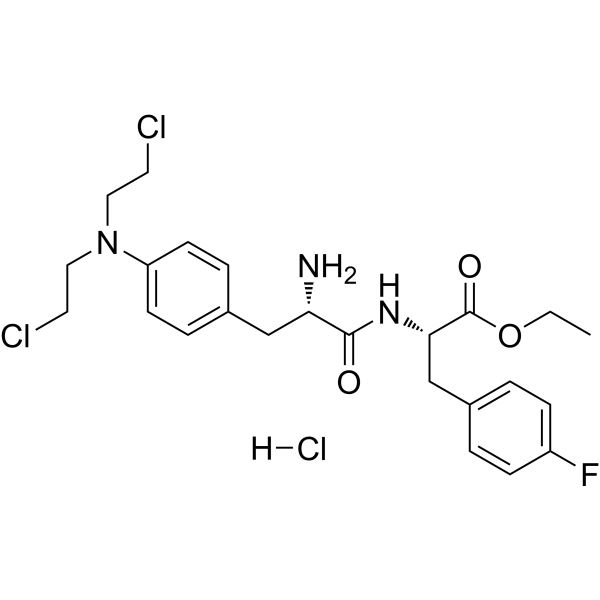
-
- HY-157216
-
|
|
HDAC
|
Cancer
|
|
HDAC1 Degrader-1 (compound 1a) is an HDAC1 degrader with anticancer activity. HDAC1 Degrader-1 significantly reduces HDAC1 levels in MM.1S multiple myeloma cells .
|
-
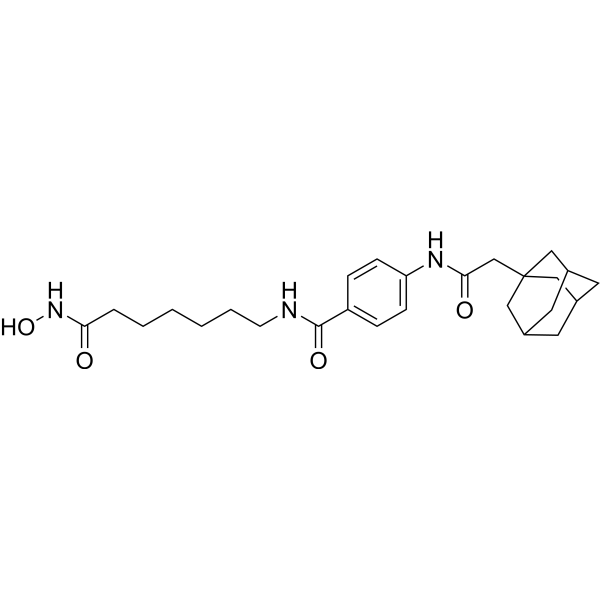
-
- HY-105019
-
|
Melphalan flufenamide
|
DNA Alkylator/Crosslinker
Apoptosis
|
Cancer
|
|
Melflufen (Melphalan flufenamide), a dipeptide proagent of Melphalan, is an alkylating agent. Melflufen shows antitumor activity against multiple myeloma (MM) cells and inhibits angiogenesis. Melflufen induces irreversible DNA damage and cytotoxicity in MM cells .
|
-
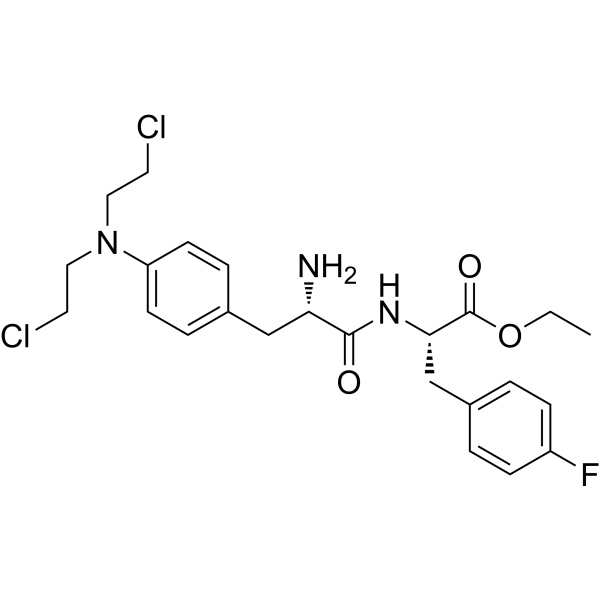
-
- HY-P1846
-
|
|
Notch
|
Cancer
|
|
Jagged-1 (188-204) is a fragment of the Jagged-1 (JAG-1) protein with Notch agonist activity. JAG-1 is a Notch ligand highly expressed in cultured and primary multiple myeloma (MM) cells. JAG-1 induces maturation of monocyte-derived human dendritic cells .
|
-
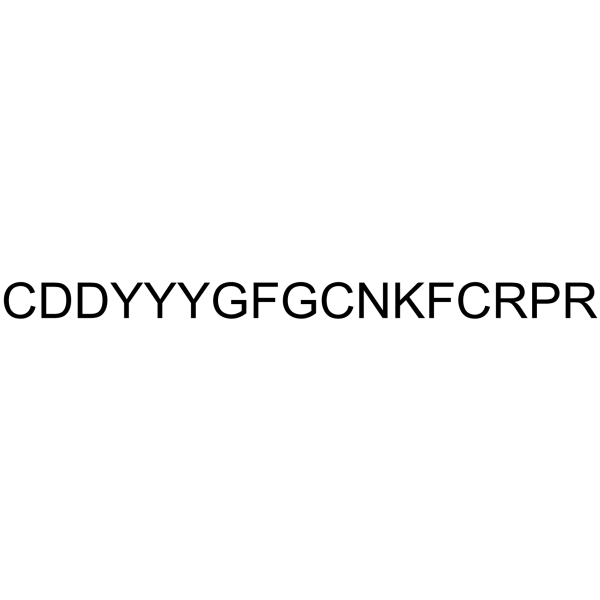
-
- HY-10224A
-
|
LBH589 lactate; NVP-LBH589 lactate
|
HDAC
HIV
Autophagy
Apoptosis
|
Infection
Cancer
|
|
Panobinostat lactate is a potent and orally active non-selective HDAC inhibitor. Panobinostat lactate has antineoplastic activities. Panobinostat lactate effectively disrupts HIV latency. Panobinostat lactate induces cell apoptosis and autophagy. Panobinostat lactate can be used for the study of refractory or relapsed multiple myeloma .
|
-
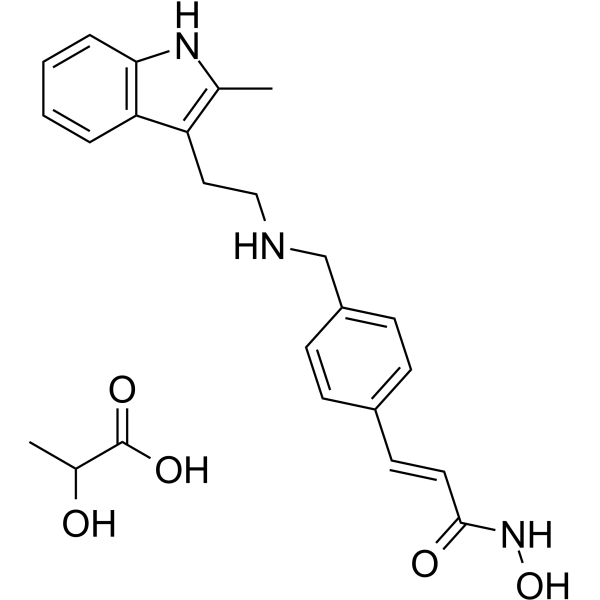
-
- HY-P1126
-
|
DLS 15
|
Microtubule/Tubulin
ADC Cytotoxin
Apoptosis
|
Cancer
|
|
Dolastatin 15 (DLS 15), a depsipeptide derived from Dolabella auricularia, is a potent antimitotic agent structurally related to the antitubulin agent Dolastatin 10. Dolastatin 15 induces cell cycle arrest and apoptosis in multiple myeloma cells. Dolastatin 15 can be used as an ADC cytotoxin .
|
-
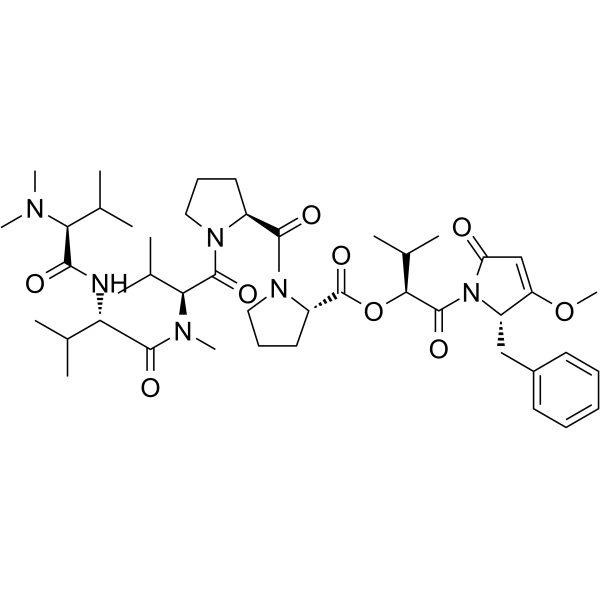
-
- HY-P1846A
-
|
|
Notch
|
Cancer
|
|
Jagged-1 (188-204) TFA is a fragment of the Jagged-1 (JAG-1) protein with Notch agonist activity. JAG-1 is a Notch ligand highly expressed in cultured and primary multiple myeloma (MM) cells. JAG-1 induces maturation of monocyte-derived human dendritic cells .
|
-

-
- HY-18712
-
BG45
2 Publications Verification
|
HDAC
Apoptosis
Caspase
|
Cancer
|
|
BG45 is a potent HDAC3 inhibitor with IC50 values of 0.289, 2, 2.2 and ﹥20 μM for HDAC3, HDAC1, HDAC2 and HDAC6, respectively. BG45 selectively targets multiple myeloma (MM) cells and induces caspase-dependent apoptosis .
|
-
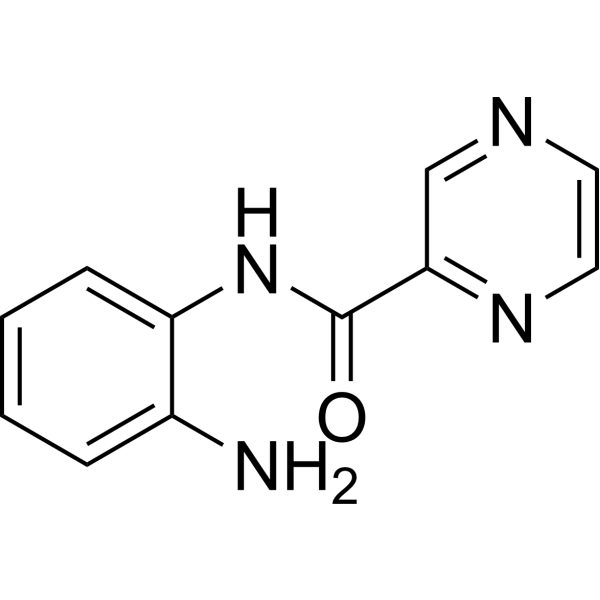
-
- HY-134582
-
dCBP-1
1 Publications Verification
|
PROTACs
Epigenetic Reader Domain
|
Cancer
|
|
dCBP-1 is a potent and selective heterobifunctional degrader of p300/CBP based on Cereblon ligand. dCBP-1 is exceptionally potent at killing multiple myeloma cells and ablates oncogenic enhancer activity driving MYC expression .
|
-
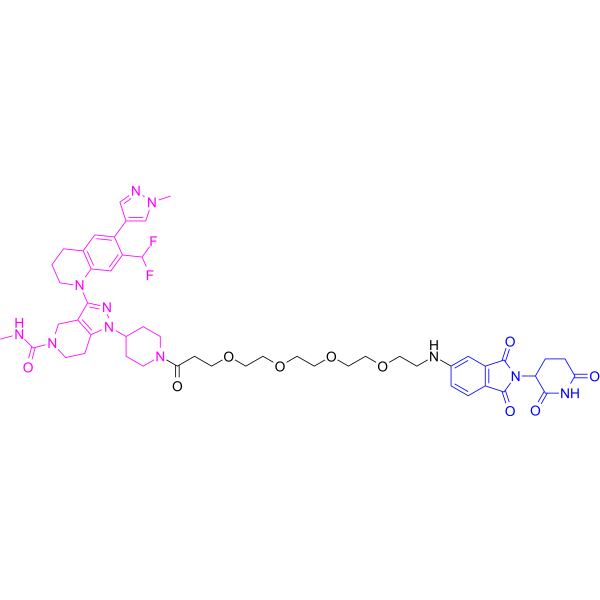
-
- HY-149832
-
|
|
Proteasome
|
Cancer
|
|
Anticancer agent 114 is a potent and orally active dipeptide boronic acid ester proteasome inhibitor with an IC50 value of 2.2 nM. Anticancer agent 114 has antiproliferative activity against the RPMI-8226 cells. Anticancer agent 114 can be used in research of multiple myeloma .
|
-
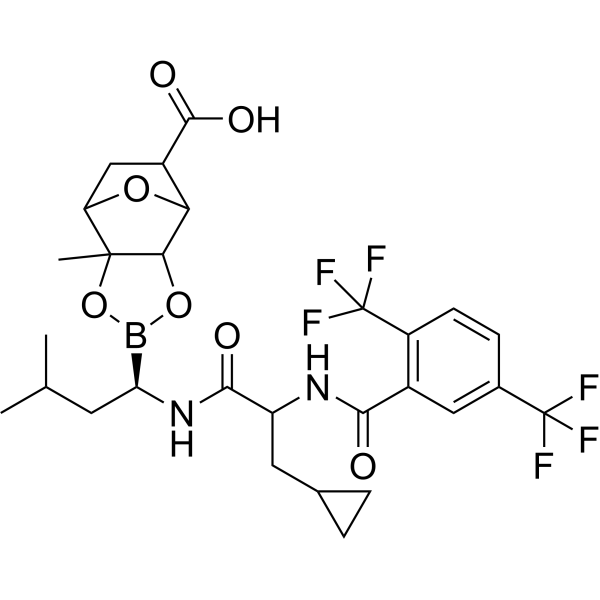
-
- HY-145322
-
|
|
Casein Kinase
Molecular Glues
|
Cancer
|
|
TMX-4116 is a casein kinase 1α (CK1α) degrader. TMX-4116 shows the degradation preference for CK1α with DC50s less than 200 nM in MOLT4, Jurkat, and MM.1S cells. TMX-4116 can be used for the research of multiple myeloma .
|
-
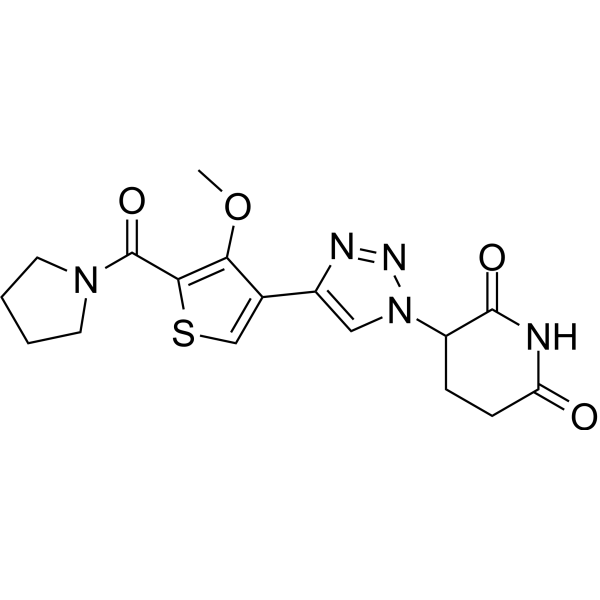
-
- HY-15519
-
|
|
IAP
FLT3
|
Cancer
|
|
LBW242, a 3-mer and Smac mimetic, is a potent and orally active proapoptotic IAP inhibitor. LBW242 shows effects on mutant FLT3-expressing cells. LBW242 has activity against multiple myeloma, and potentiates TRAIL- and anticancer agent-mediated cell death of ovarian cancer cells .
|
-
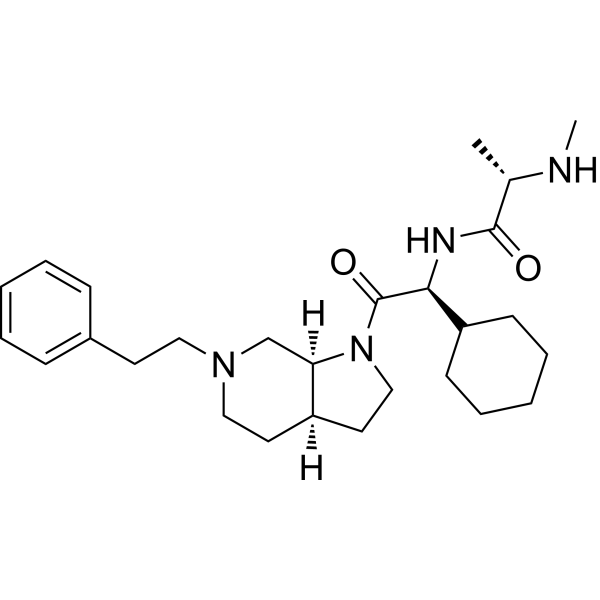
-
- HY-145667
-
|
Biotin-JQ1
|
Epigenetic Reader Domain
|
Cancer
|
|
Biotinylated-JQ1 (Biotin-JQ1) is a biotinylated derivative of JQ1 with high affinity for the bromodomain of BRD4. Biotinylated-JQ1 inhibits MM1.S multiple myeloma cells proliferation with the EC50 of 0.4 μM .
|
-
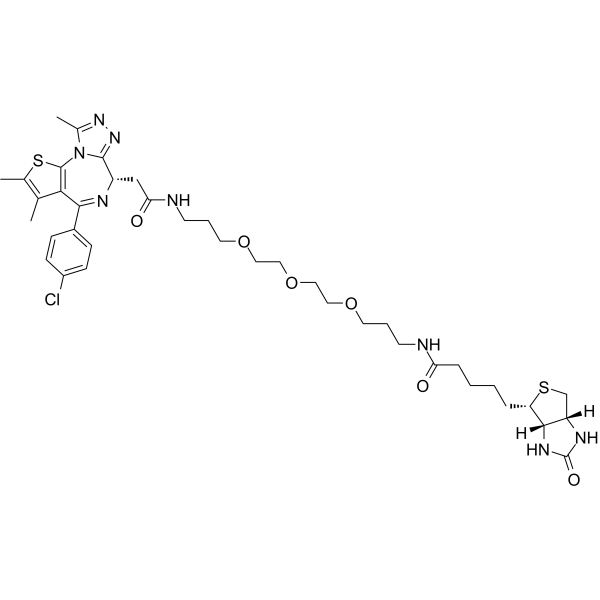
-
- HY-144763
-
|
|
Apoptosis
|
Cancer
|
|
XPO1-IN-1 (compound D4) is an orally active and potent XPO1 inhibitor, with an IC50 of 24 nM in MM.1S cell. XPO1-IN-1 can efficiently induce cell apoptosis and cell cycle arrest. XPO1-IN-1 displays favorable metabolic stability and pharmacokinetic properties. XPO1-IN-1 can be used for multiple myeloma (MM) research .
|
-
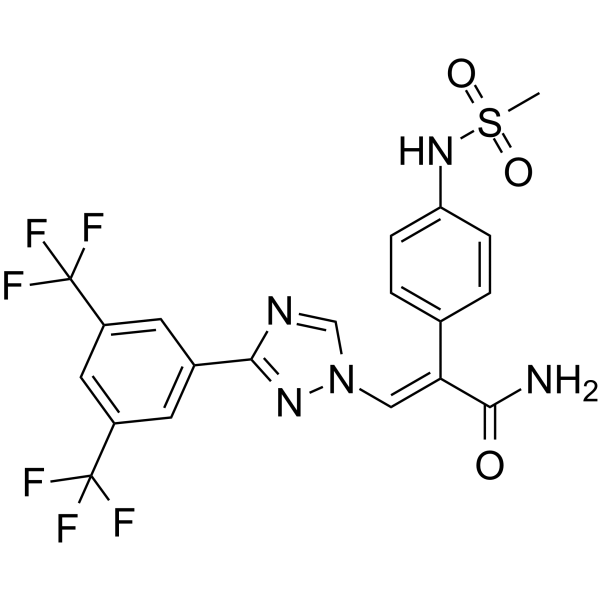
-
- HY-P99287
-
|
B-E8; Anti-IL-6 MAB B-E8; Anti-Human IL6 Recombinant Antibody
|
Interleukin Related
|
Inflammation/Immunology
Cancer
|
|
Elsilimomab (B-E8) is a IgG1 monoclonal antibody against interleukin-6 (IL-6), with a KD of 22 pM and an IC50 of 1.4 nM. Elsilimomab can be used for the research of multiple myeloma, renal cell carcinoma, and rheumatoid arthritis (RA) .
|
-

-
- HY-115445
-
|
|
Apoptosis
SOD
|
Cancer
|
|
LCS-1 is a superoxide dismutase 1 (SOD1) inhibitor. LCS-1 inhibits SOD1 activity with an IC50 value of 1.07 μM. LCS-1 induces the early- and late-stage apoptosis of multiple myeloma (MM.1S) cells .
|
-
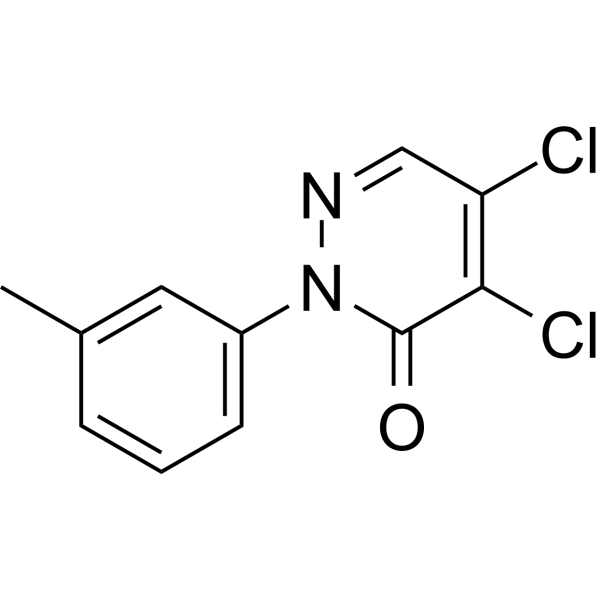
-
- HY-P99814
-
|
AMG-701
|
CD3
|
Inflammation/Immunology
Cancer
|
|
Pavurutamab (AMG-701) is a bispecific T cell engager molecule that anti-CD3 and anti-B cell maturation antigens (BCMA). Pavurutamab has an extended half-life based on Pacanalotamab (HY-P99798). The Fc of Pavurutamab is coupled to molecules to improve pharmacokinetic parameters. Pavurutamab has potential applications in immune regulation and multiple myeloma (MM) .
|
-

-
- HY-145321
-
|
|
Phosphodiesterase (PDE)
Molecular Glues
|
Cancer
|
|
TMX-4100 is a selective phosphodiesterase 6D (PDE6D) degrader. TMX-4100 shows a high degradation preference for PDE6D with the DC50 values less than 200 nM in MOLT4, Jurkat, and MM.1S cells. TMX-4100 can be used for the research of multiple myeloma .
|
-
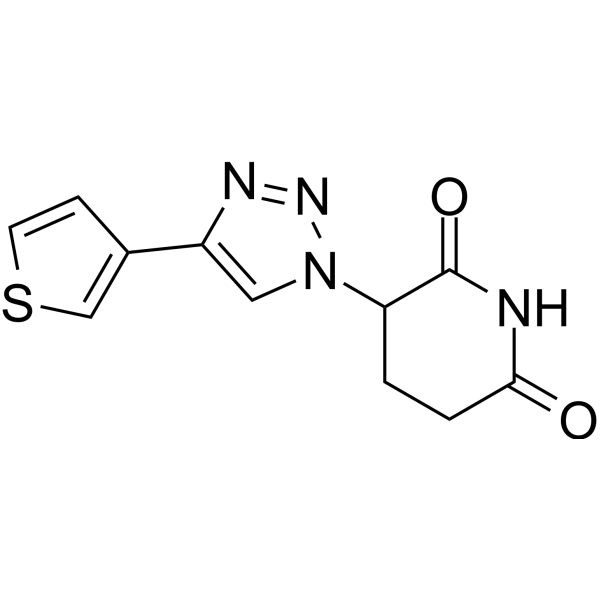
-
- HY-117987
-
-
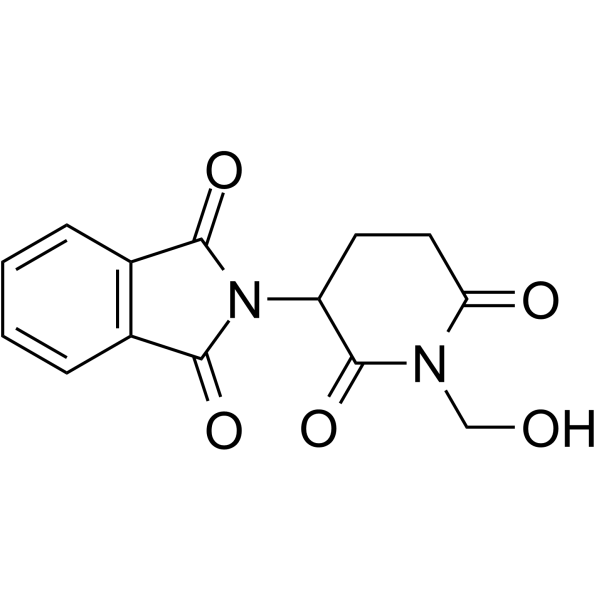
-
- HY-118266
-
BTdCPU
1 Publications Verification
|
Phosphatase
Apoptosis
|
Cancer
|
|
BTdCPU is a potent heme regulated inhibitor kinase (HRI) activator that promotes eIF2α phosphorylation and induces apoptosis in Dexamethasone (HY-14648) (Dex)-resistant cancer cells. BTdCPU can be used in the study of cancers such as multiple myeloma and Dex-resistant multiple myeloma .
|
-
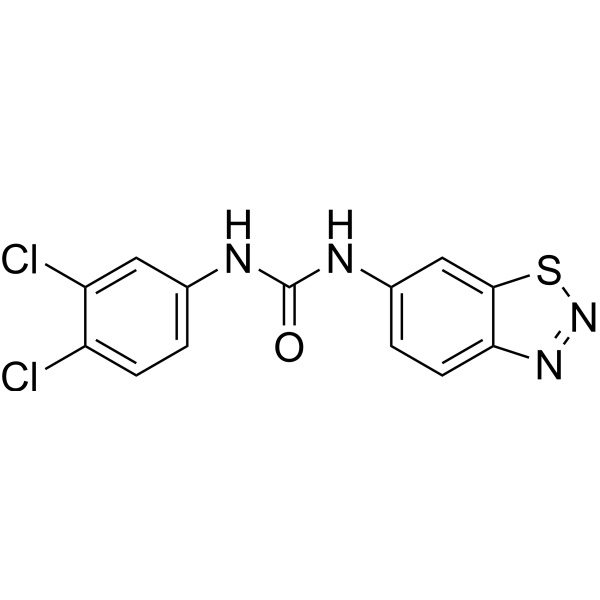
-
- HY-100430
-
|
|
Apoptosis
PDI
|
Cancer
|
|
CCF642 is a potent protein disulfide isomerases (PDI) inhibitor with an IC50 of 2.9 μM. CCF642 causes acute endoplasmic reticulum (ER) stress in multiple myeloma cells accompanied by apoptosis-inducing calcium release. CCF642 has broad anti-multiple myeloma activity .
|
-
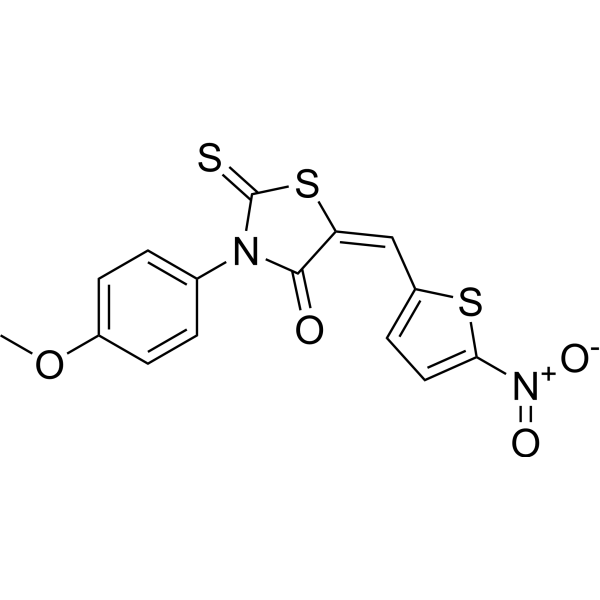
-
- HY-131958
-
|
|
AMPK
|
Cancer
|
|
D942 is a cell penetrant AMPK activator and partially inhibits the mitochondrial complex I. In multiple myeloma cells, D942 inhibits cell growth .
|
-
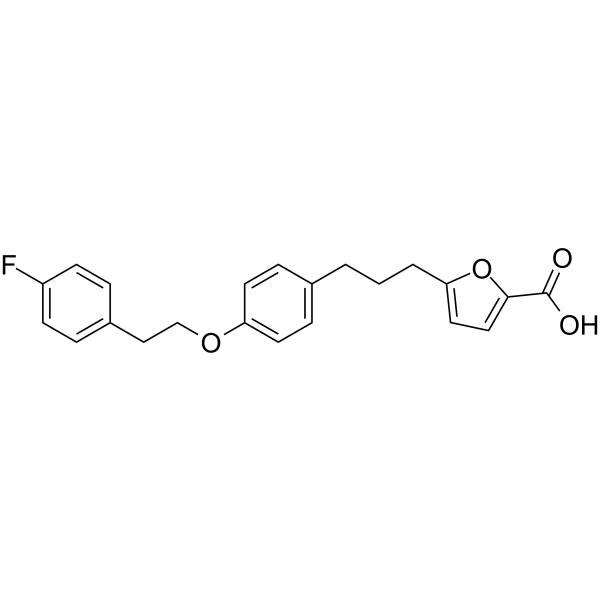
-
- HY-P99536
-
|
SL-401
|
Interleukin Related
|
Cancer
|
|
Tagraxofusp (SL-401) is a potent IL-3 receptor inhibitor to inhibits plasmacytoid dendritic cells (pDCs) growth in multiple myeloma (MM) bone marrow (BM) microenvironment. Tagraxofusp has synergistic effect with Bortezomib (HY-10227) and Pomalidomide (HY-10984) to suppress multiple myeloma (MM) .
|
-
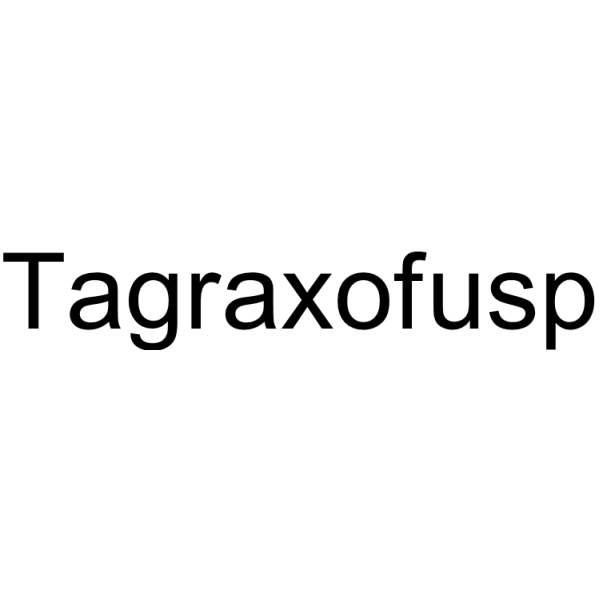
-
- HY-142817
-
|
|
G Protein-coupled Receptor Kinase (GRK)
|
Cancer
|
|
GRK6-IN-2 (compound 10a) is a potent inhibitor of G protein-coupled receptor kinase 6 (GRK6) with an IC50 of 120 nM. GRK6 is a critical kinase required for the survival of multiple myeloma (MM) cells. GRK6-IN-2 has the potential for the research of multiple myeloma .
|
-
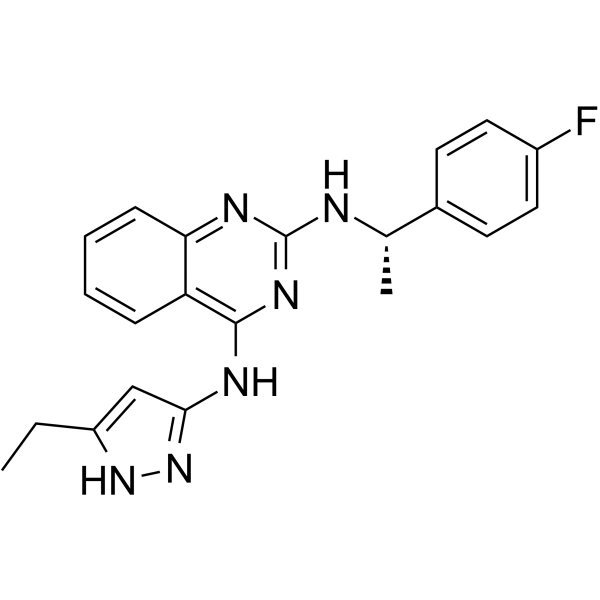
-
- HY-142812
-
|
|
G Protein-coupled Receptor Kinase (GRK)
|
Cancer
|
|
GRK6-IN-1 (compound 18) is a potent inhibitor of G protein-coupled receptor kinase 6 (GRK6) with an IC50 of 120 nM. GRK6 is a critical kinase required for the survival of multiple myeloma (MM) cells. GRK6-IN-1 has the potential for the research of multiple myeloma .
|
-
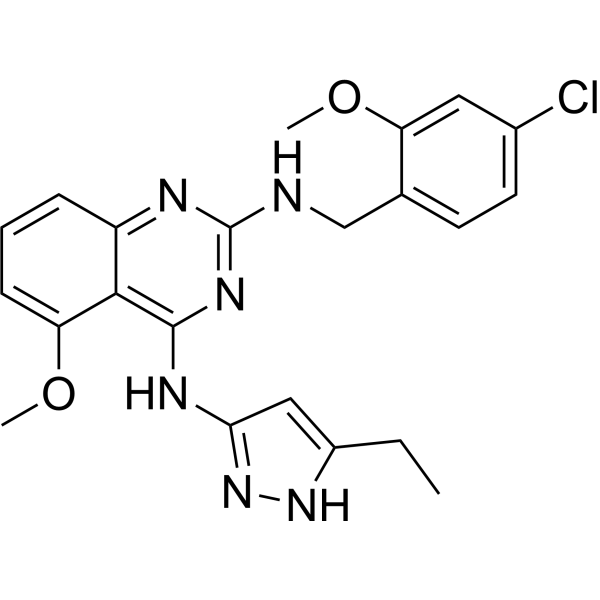
-
- HY-149513
-
|
|
c-Myc
Apoptosis
|
Cancer
|
|
EP12 is a c-Myc inhibitor. EP12 is a c-Myc G4 stabilizer. EP12 induces apoptosis and DNA damage in multiple myeloma cells. EP12 disrupts the nuclear translocation of P65/P50 by interfering with the NF-κB signaling pathway. EP12 inhibits multiple myeloma growth .
|
-
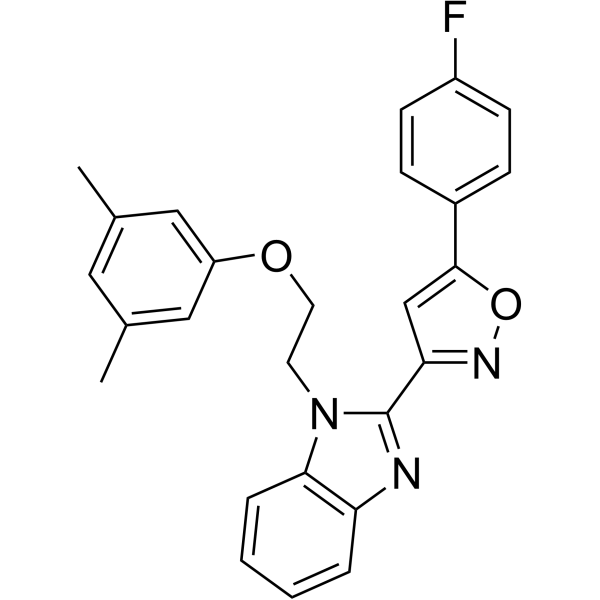
-
- HY-116304
-
1G244
3 Publications Verification
|
Dipeptidyl Peptidase
Apoptosis
|
Cancer
|
|
1G244 is a potent DPP8/9 inhibitor with IC50s of 12 nM and 84 nM, respectively. 1G244 does not inhibit DPPIV and DPPII. 1G244 induces apoptosis in multiple myeloma cells and has anti-myeloma effects .
|
-
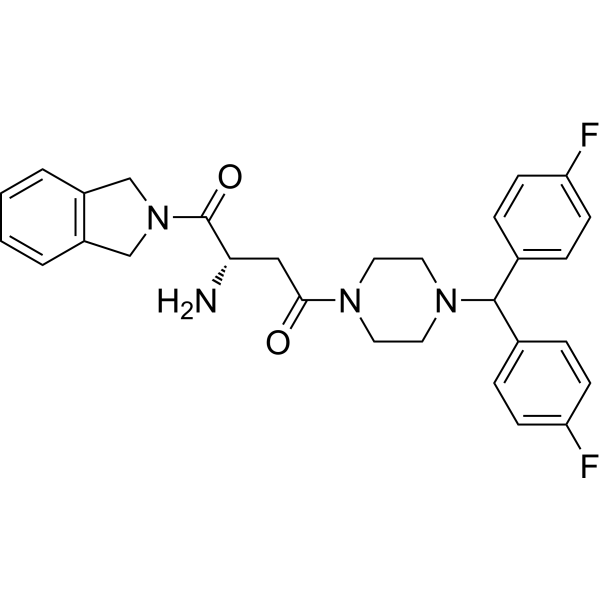
-
- HY-138691
-
|
JADA82; PCK82
|
Histone Demethylase
|
Cancer
|
|
JQKD82 (JADA82) is a cell-permeable and selective KDM5 inhibitor. JQKD82 increases H3K4me3 and can be used for the research of multiple myeloma .
|
-
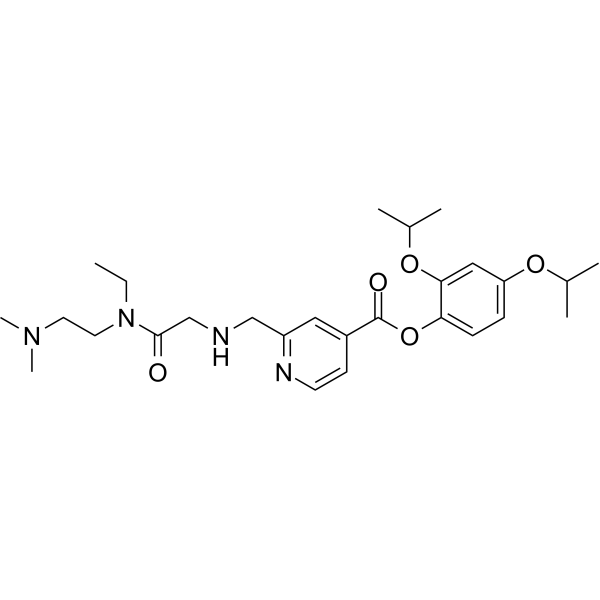
-
- HY-138691A
-
|
JADA82 trihydrochloride; PCK82 trihydrochloride
|
Histone Demethylase
|
Cancer
|
|
JQKD82 (JADA82) trihydrochloride is a cell-permeable and selective KDM5 inhibitor. JQKD82 trihydrochloride increases H3K4me3 and can be used for the research of multiple myeloma .
|
-
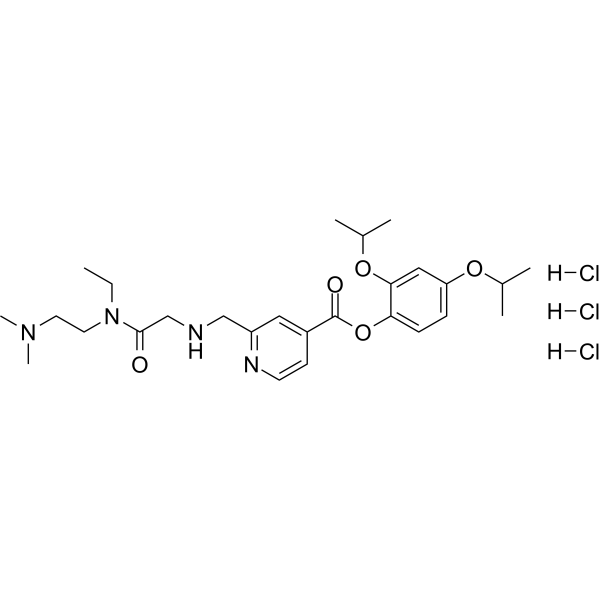
-
- HY-138691B
-
|
JADA82 dihydrochloride; PCK82 dihydrochloride
|
Histone Demethylase
|
Cancer
|
|
JQKD82 (JADA82) dihydrochloride is a cell-permeable and selective KDM5 inhibitor. JQKD82 dihydrochloride increases H3K4me3 and can be used for the research of multiple myeloma .
|
-
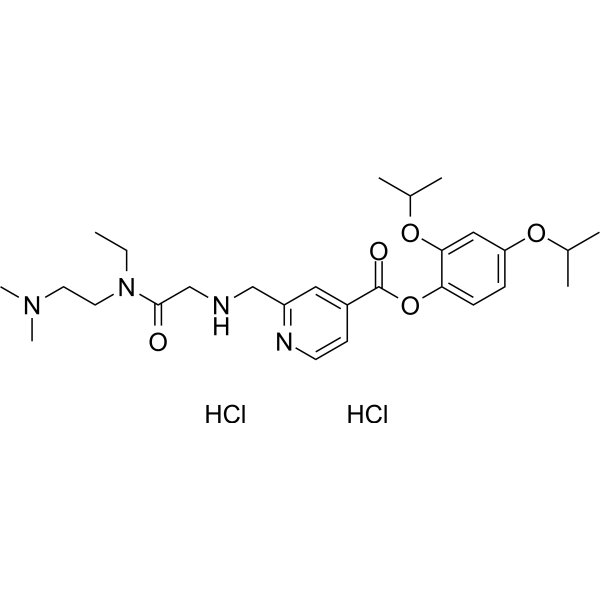
-
- HY-160696
-
|
|
CD73
|
Cancer
|
|
ORIC-533 is an orally active, selective CD73 inhibitor with AMP-competition. ORIC-533 restores immunosuppressed CD8+ T cell proliferation and activation, triggers significant lysis and cell death of multiple myeloma cells in the bone marrow microenvironment .
|
-
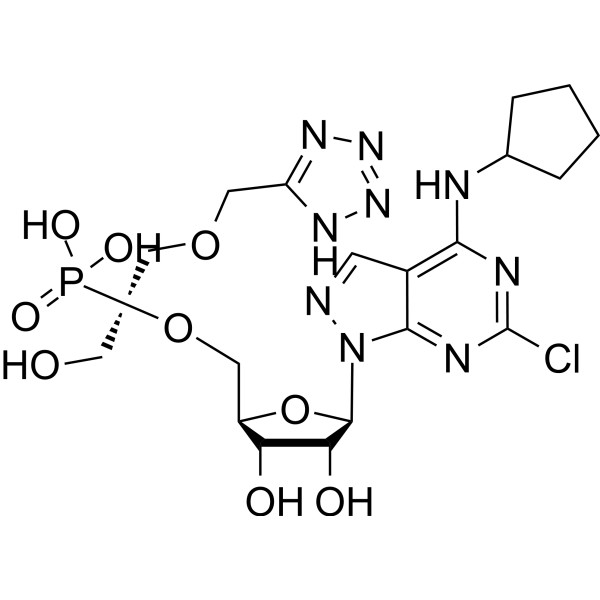
-
- HY-P99798
-
|
AMG 420; BI-836909
|
CD3
|
Cancer
|
|
Pacanalotamab (AMG 420; BI-836909) is a bispecific T-cell engager (BiTE) targeting to BCMA and CD3ɛ. BCMA refers to B cell maturation antigen, as Pacanalotamab redirecting T cells to BCMA expressing cells on the cell surface. Pacanalotamab conducts T-cell redirected lysis of human multiple myeloma (MM) cell lines .
|
-

-
- HY-P99453
-
|
|
ADC Antibody
|
Cancer
|
|
Azintuxizumab is a monoclonal, targeting to B-cell maturation antigen (BCMA) and SLAMF7/CRACC/CD319, IgG1 bispecific antibody. Azintuxizumab has the potential for the research of relapsed/refractory multiple myeloma (RRMM) .
|
-

-
- HY-149672
-
|
|
Bcl-2 Family
|
Cancer
|
|
ABBV-467 is a selective MCL-1 inhibitor (Ki: <0.01 nM). ABBV-467 induces apoptosis. ABBV-467 induces cancer cell death and inhibits tumor growth in models of hematological malignancies, such as multiple myeloma .
|
-
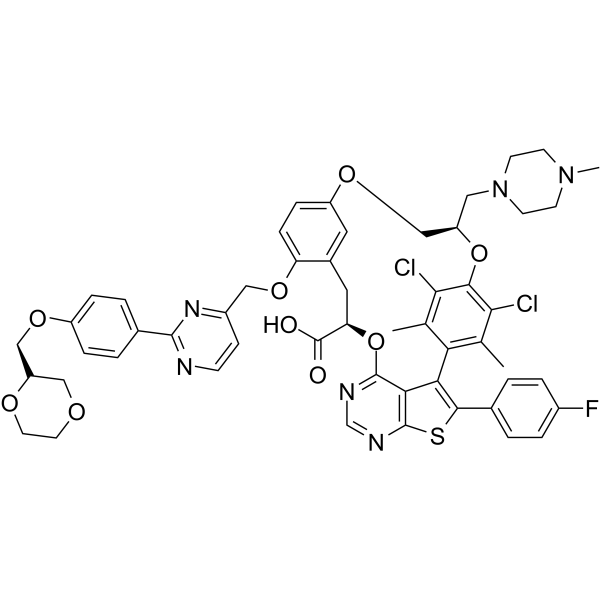
-
- HY-111790
-
M3258
1 Publications Verification
|
Proteasome
Apoptosis
|
Cancer
|
|
M3258 is an orally bioavailable, potent, reversible and highly selective immunoproteasome subunit LMP7 (β5i) inhibitor. M3258 exerts high biochemical (IC50=3.6 nM) and cellular (IC50=3.4 nM) potency against the LMP7 subunit. M3258 shows strong antitumor efficacy in multiple myeloma xenograft models. M3258 leads to a significant and prolonged suppression of tumor LMP7 activity and ubiquitinated protein turnover and the induction of apoptosis in multiple myeloma cells .
|
-
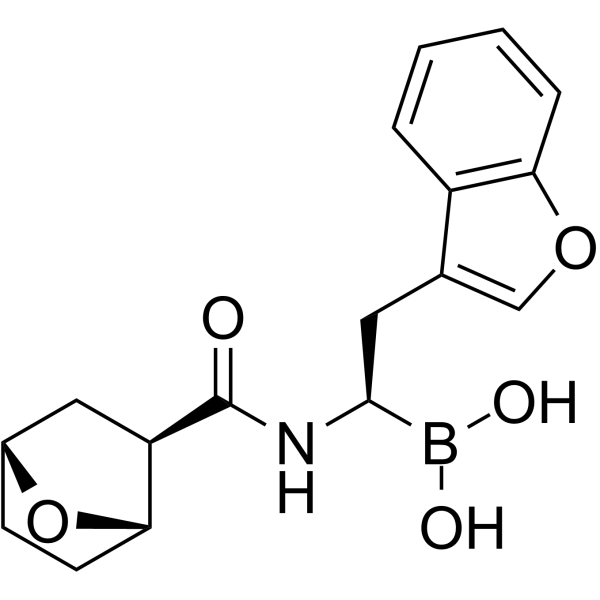
-
- HY-P99601
-
|
BFCR 4350A; RG 6160; RO 7187797
|
CD3
|
Neurological Disease
Cancer
|
|
Cevostamab (BFCR4350A; RG6160; RO7187797) is a humanized IgG1-based BsAb that targets membrane-proximal extracellular domain of FcRH5 on multiple myeloma (MM) cells as well as CD3 on T cells. Moreover, Cevostamab facilitates efficient synapse formation, improves killing activity of T cells against MM tumor cells .
|
-

-
- HY-10224S
-
|
LBH589-d4; NVP-LBH589-d4
|
HDAC
Autophagy
HIV
Apoptosis
|
Cancer
|
|
Panobinostat-d4 is the deuterium labeled Panobinostat. Panobinostat (LBH589; NVP-LBH589) is a potent and orally active non-selective HDAC inhibitor, and has antineoplastic activities[1][2]. Panobinostat induces HIV-1 virus production even at low concentration range 8-31 nM, stimulates HIV-1 expression in latently infected cells[4]. Panobinostat induces cell apoptosis and autophagy. Panobinostat can be used for the study of refractory or relapsed multiple myeloma[3].
|
-
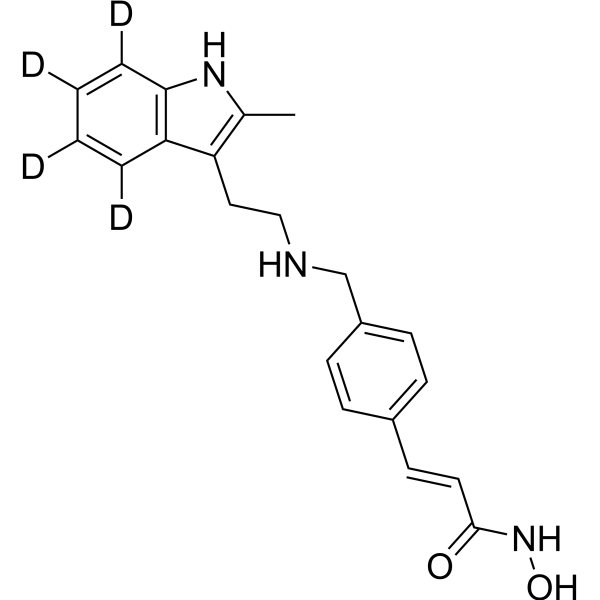
-
- HY-10224S1
-
|
LBH589-d4 hydrochloride; NVP-LBH589-d4 hydrochloride
|
Isotope-Labeled Compounds
HDAC
Autophagy
HIV
Apoptosis
|
Cancer
|
|
Panobinostat-d4 (hydrochloride) is deuterium labeled Panobinostat. Panobinostat (LBH589; NVP-LBH589) is a potent and orally active non-selective HDAC inhibitor, and has antineoplastic activities[1][2]. Panobinostat induces HIV-1 virus production even at low concentration range 8-31 nM, stimulates HIV-1 expression in latently infected cells[4]. Panobinostat induces cell apoptosis and autophagy. Panobinostat can be used for the study of refractory or relapsed multiple myeloma[3].
|
-
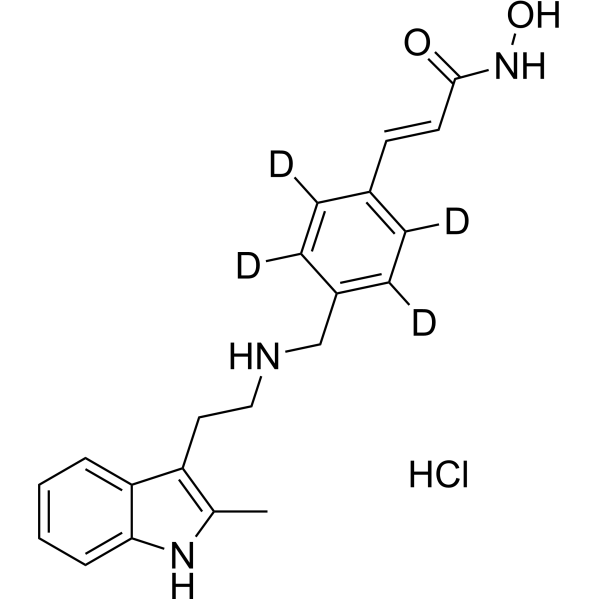
-
- HY-134262
-
|
8-Bromoadenosine 5'-triphosphate; 8-Br-ATP
|
P2X Receptor
|
Cancer
|
|
8-Bromo-ATP (8-Bromoadenosine 5'-triphosphate), an ATP analogue, is a purinergic P2X receptor agonist. 8-Bromo-ATP shows cytotoxic to multiple myeloma cells with an IC50 of 23.1 μM .
|
-
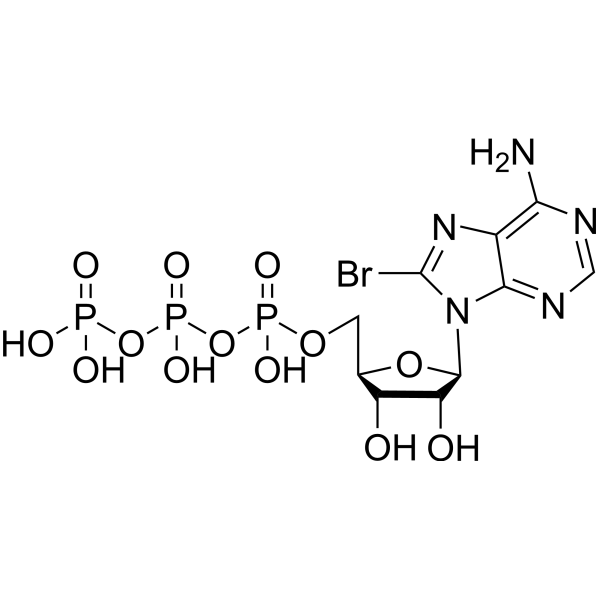
-
- HY-P9915
-
|
Anti-Human CD38, Human Antibody
|
CD38
ADC Antibody
|
Inflammation/Immunology
Cancer
|
|
Daratumumab (Anti-Human CD38) is the first-in-class human-specific anti-CD38 monoclonal antibody (IgG1). Daratumumab has anti-multiple myeloma (MM) effect. Daratumumab impairs MM cell adhesion, which results in an increased sensitivity of MM to proteasome inhibition .
|
-

-
- HY-15473
-
|
ML120B
|
IKK
|
Cancer
|
|
MLN120B (ML120B) is a potent, ATP competitive, and orally active inhibitor of IKKβ with an IC50 of 60 nM. MLN120B inhibits multiple myeloma cell growth in vitro and in vivo and also can be used for the research of rheumatoid arthritis .
|
-
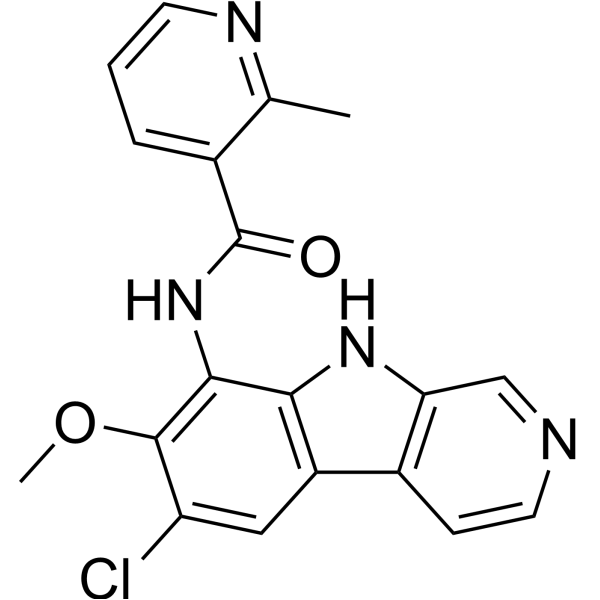
-
- HY-15473A
-
|
ML120B dihydrochloride
|
IKK
|
Inflammation/Immunology
Cancer
|
|
MLN120B dihydrochloride (ML120B dihydrochloride) is a potent, ATP competitive, and orally active inhibitor of IKKβ with an IC50 of 60 nM. MLN120B inhibits multiple myeloma cell growth in vitro and in vivo and also can be used for the research of rheumatoid arthritis .
|
-
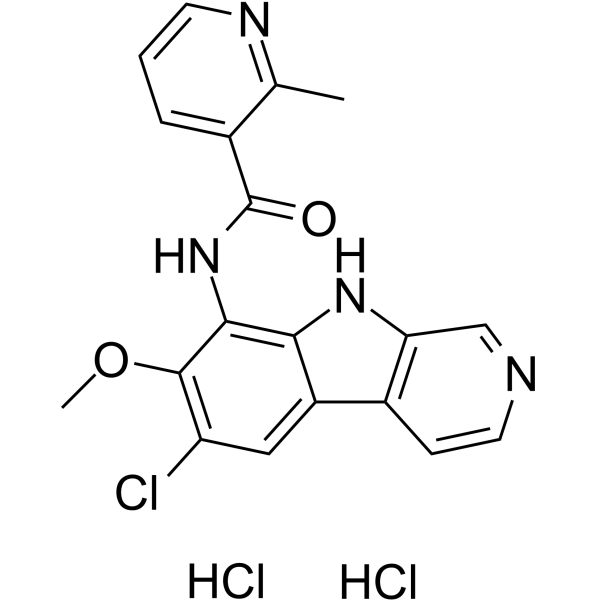
-
- HY-16462
-
|
|
CDK
|
Cancer
|
|
CDK9-IN-2 is a special cyclin-dependent kinase 9 (CDK9) inhibitor, extracted from patent WO/2012131594A1, compound CDKI(8), has an IC50 of 5 nM and 7 nM in H929 multiple myeloma(MM) cell line (72 hours) and A2058 skin cell line (72 hours), respectively.
|
-
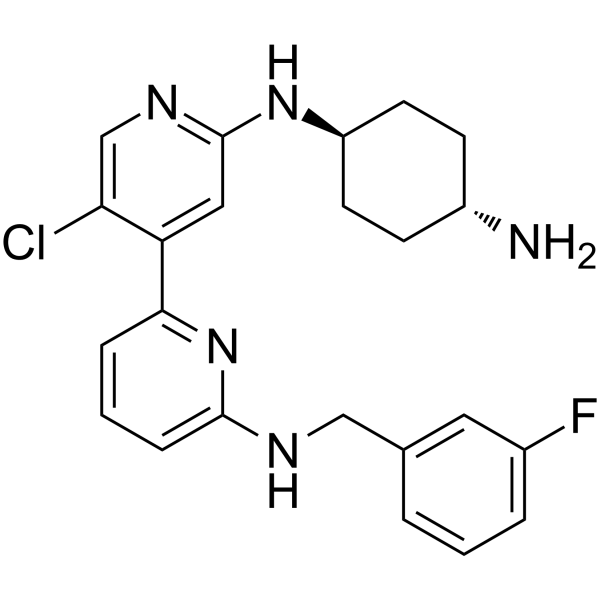
-
- HY-144858
-
EZM0414
3 Publications Verification
|
Histone Methyltransferase
|
Cancer
|
|
EZM0414 is a potent, selective, orally bioavailable inhibitor of SETD2 (IC50=18 nM in SETD2 biochemical assay; IC50=34 nM in cellular assay). EZM0414 can be used for the research of relapsed or refractory multiple myeloma and diffuse large B-cell lymphoma .
|
-
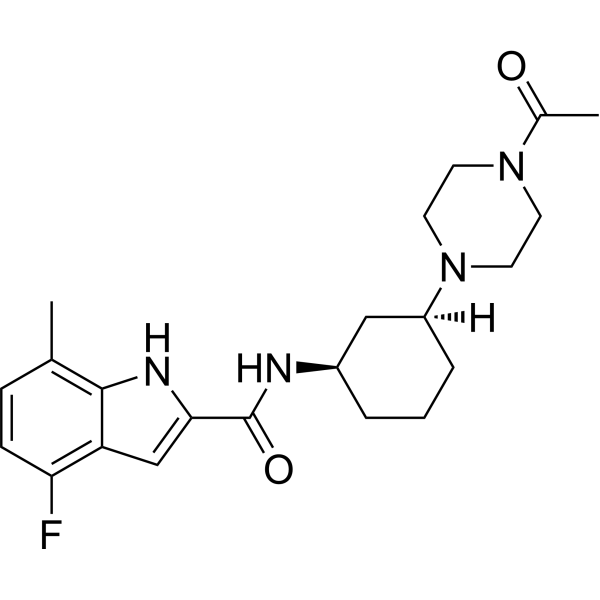
-
- HY-P9915A
-
|
Anti-Human CD38, Human Antibody (PBS)
|
ADC Antibody
CD38
|
Cancer
|
|
Daratumumab (PBS) (Anti-Human CD38) is the first-in-class human-specific anti-CD38 monoclonal antibody (IgG1). Daratumumab (PBS) has anti-multiple myeloma (MM) effect. Daratumumab (PBS) impairs MM cell adhesion, which results in an increased sensitivity of MM to proteasome inhibition .
|
-
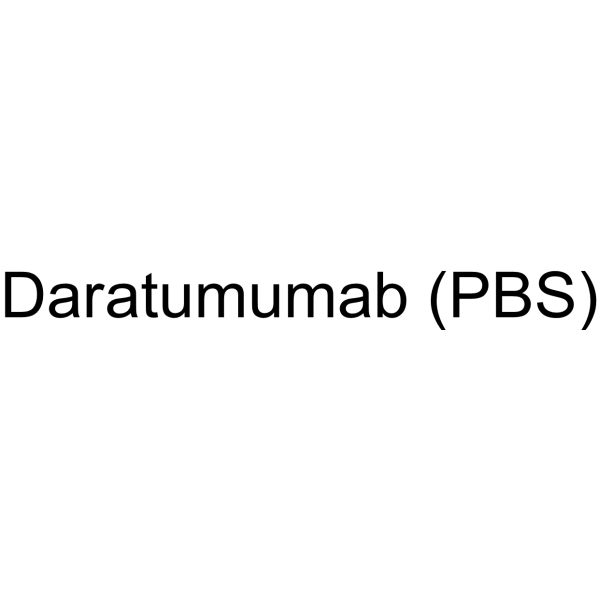
-
- HY-125835
-
CP-10
1 Publications Verification
|
PROTACs
CDK
|
Cancer
|
|
CP-10 is a PROTAC connected by ligands for Cereblon and CDK, with highly selective, specific, and remarkable CDK6 degradation (DC50=2.1 nM). It inhibits proliferation of several haematopoietic cancer cells with impressive potency including multiple myeloma, and can still degrades mutated and overexpressed CDK6 .
|
-
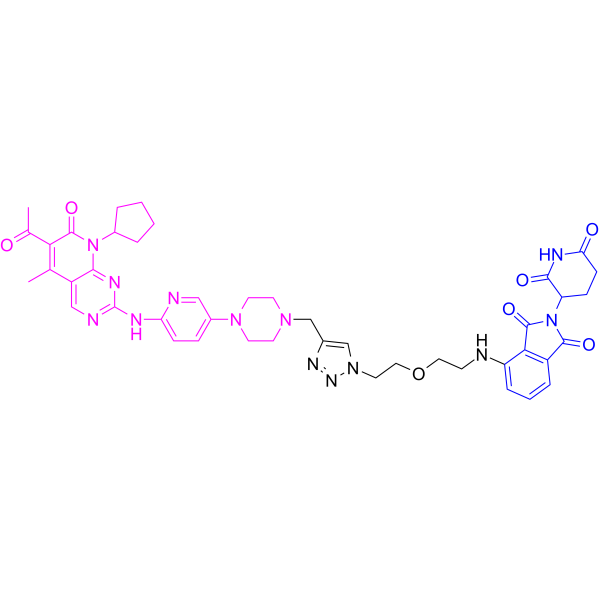
-
- HY-P99167
-
|
HCD122
|
TNF Receptor
|
Cancer
|
|
Lucatumumab (HCD122) is a fully human anti-CD40 antagonist monoclonal antibody, which blocks CD40/CD40L-mediated signaling. Lucatumumab efficiently mediates antibody-dependent cell-mediated cytotoxicity (ADCC) and clearance of tumor cells, can be used for refractory lymphomas, CLL and multiple myeloma research .
|
-

-
- HY-Q04764
-
|
|
Thyroid Hormone Receptor
Apoptosis
|
Cancer
|
|
TI17 is an inhibitor of the thyroid hormone receptor-interacting protein Trip13 and has anticancer activity. TI17 effectively inhibits multiple myeloma (MM) cell proliferation and induces cell cycle arrest and apoptosis. Trip13 is an AAA-ATPase that mediates double-strand break (DSB) repair; TI17 inhibits Trip13 function and increases DNA damage .
|
-
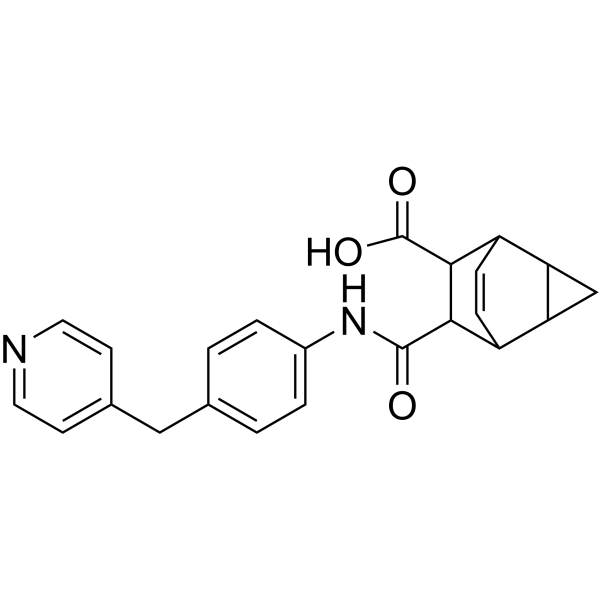
-
- HY-P99015
-
|
|
TNF Receptor
|
Cancer
|
|
Dacetuzumab (SGN-40) is a humanized IgG1, anti-CD40 monoclonal antibody with anti-lymphoma activity. Dacetuzumab kills tumor cells via immune effector functions (antibody-dependent cellular cytotoxicity and phagocytosis [ADCC/ADCP]). Dacetuzumab ((SGN-40) can be used for multiple myeloma research .
|
-

- HY-147158
-
|
|
Molecular Glues
Ligands for E3 Ligase
|
Cancer
|
|
ZXH-1-161 is a potent cereblon (CRBN) modulator with an IC50 value of 39 nM in MM1.S wild type cells. ZXH-1-161 has selective degradation activity towards GSPT1. ZXH-1-161 can be used for researching multiple myeloma .
|
-
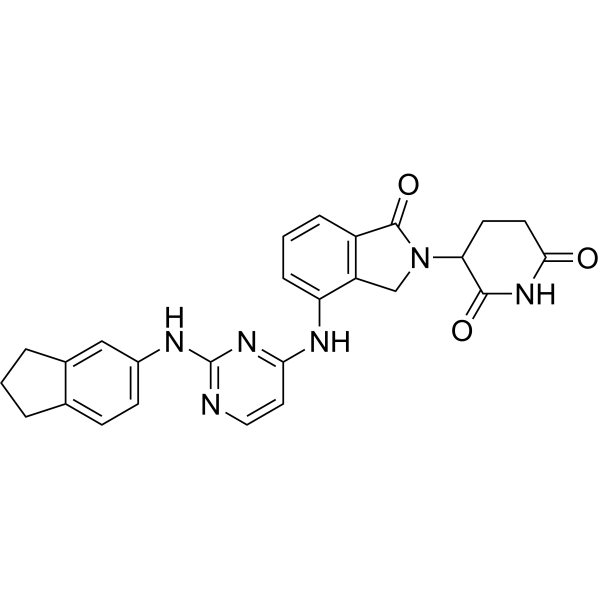
- HY-149019
-
|
|
c-Kit
Apoptosis
|
Cancer
|
|
Antitumor agent-70 (compound 8b) has anti-tumor activity and can induce cell apoptosis. Antitumor agent-70 inhibits multiple myeloma with an IC50 value of 0.12 μM. Antitumor agent-70 is a potential multi-targeted kinase inhibitor especially for c-Kit .
|
-
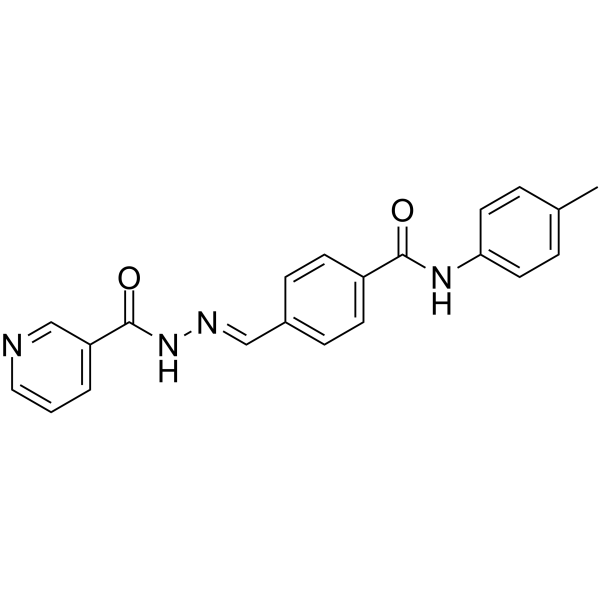
- HY-P99730
-
|
TAK-079
|
CD38
|
Cancer
|
|
Mezagitamab (TAK-079) is a IgG1λ anti-CD38 monoclonal antibody. Mezagitamab depletes tumor cells expressing CD38 through antibody and complement dependent cytotoxicity. Mezagitamab has potential application in relapsed/refractory multiple myeloma (RRMM) and idiopathic thrombocytopenic purpura (ITP) .
|
-

- HY-123587
-
|
|
Proteasome
Apoptosis
|
Cancer
|
|
PR-924 is a selective tripeptide epoxyketone immunoproteasome subunit LMP-7 inhibitor with an IC50 of 22 nM. PR-924 covalently modifies proteasomal N-terminal threonine active sites. PR-924 inhibits growth and triggers apoptosis in multiple myeloma (MM) cells. PR-924 has antitumor activities .
|
-
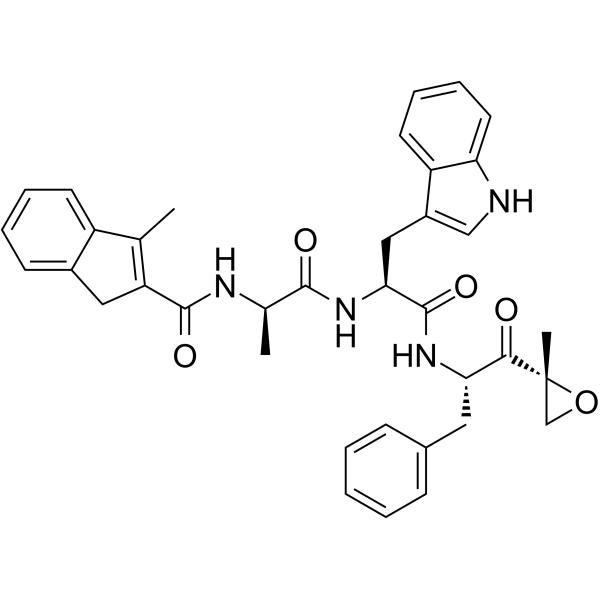
- HY-150595
-
|
|
HDAC
Microtubule/Tubulin
|
Cancer
|
|
HDAC6-IN-10 is a highly selective HDAC6 inhibitor with the IC50 of 0.73 nM. HDAC6-IN-10 has 144~10941-fold selectivity over other HDAC isoforms. HDAC6-IN-10 shows anti-proliferative activities against multiple myeloma cells .
|
-
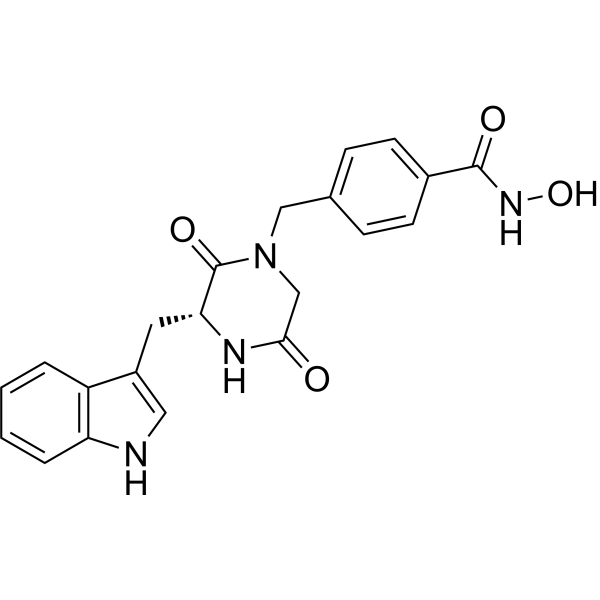
- HY-110208
-
BRD9876
1 Publications Verification
|
Kinesin
Microtubule/Tubulin
|
Cancer
|
|
BRD9876 is the “rigor” inhibitor that locks kinesin-5 (Eg5) in a state with enhanced microtubules (MTs) binding, leading to bundling and stabilization of MTs. BRD9876 interacts with the tyrosine 104 residue that is part of the α4-α6 allosteric binding pocket. BRD9876 specifically targets microtubule-bound Eg5 and selectively inhibits myeloma over CD34 cells. BRD9876 has the potential for multiple myeloma (MM) research .
|
-
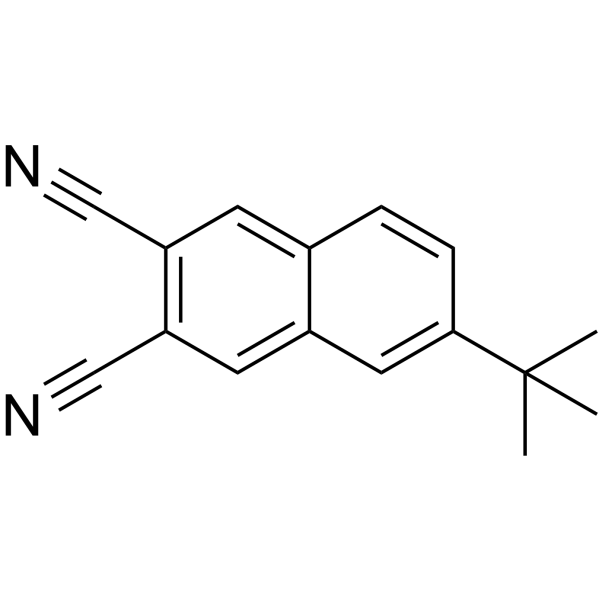
- HY-P9976
-
|
|
Apoptosis
|
Cancer
|
|
Isatuximab is a monoclonal antibody targeting the transmembrane receptor and ectoenzyme CD38, a protein highly expressed on hematological malignant cells, including those in multiple myeloma (MM). Isatuximab has antitumor activity via multiple biological mechanisms, including antibody-dependent cellular-mediated cytotoxicity, complement-dependent cytotoxicity, antibody-dependent cellular phagocytosis, and direct induction of apoptosis without crosslinking. Isatuximab also directly inhibits CD38 ectoenzyme activity, which is implicated in many cellular functions .
|
-

- HY-156279
-
|
|
Apoptosis
HDAC
|
Cancer
|
|
HDAC6-IN-22 (compound 30) is a inhibitor of HDAC6, with the IC50 of 4.63 nM. HDAC6-IN-22 has antiproliferative effects in vitro and in vivo towards multiple myeloma. HDAC6-IN-22
induces cell cycle arrest in the G2 phase and promotes apoptosis through the mitochondrial pathway .
|
-
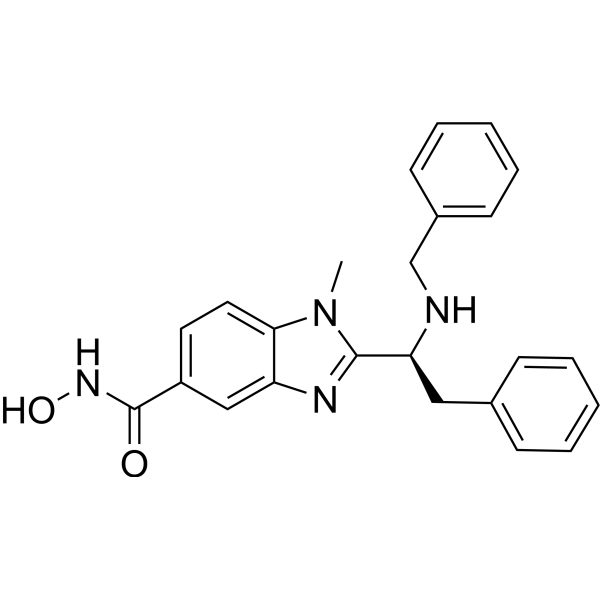
- HY-144129
-
|
|
Apoptosis
|
Cancer
|
|
hGGPPS-IN-2 (Compound 16g) is a potent inhibitor of the human geranylgeranyl pyrophosphate synthase (hGGPPS). hGGPPS-IN-2 is an analogue of C-2-substituted thienopyrimidine-based bisphosphonates (C2-ThP-BPs). hGGPPS-IN-2 induces target-selective apoptosis of multiple myeloma (MM) cells and exhibits antimyeloma activity in vivo .
|
-
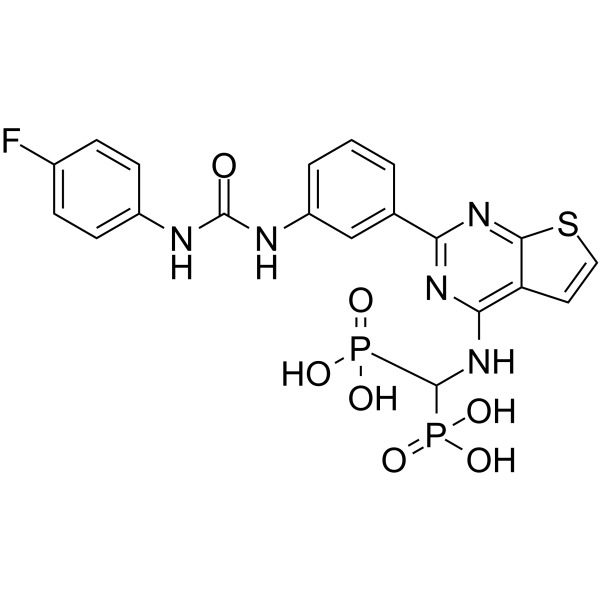
- HY-144130
-
|
|
Apoptosis
|
Cancer
|
|
hGGPPS-IN-3 (Compound 13h) is a potent inhibitor of the human geranylgeranyl pyrophosphate synthase (hGGPPS). hGGPPS-IN-3 is an analogue of C-2-substituted thienopyrimidine-based bisphosphonates (C2-ThP-BPs). hGGPPS-IN-3 induces target-selective apoptosis of multiple myeloma (MM) cells and exhibits antimyeloma activity in vivo .
|
-
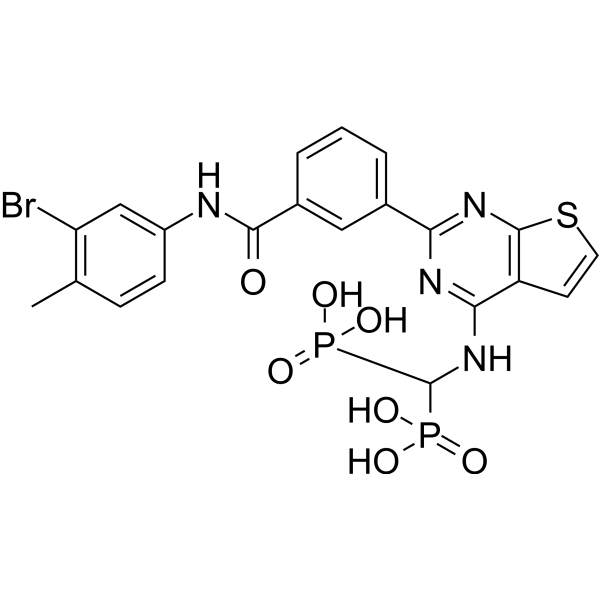
- HY-144128
-
|
|
Apoptosis
|
Cancer
|
|
hGGPPS-IN-1 (Compound 18b) is a potent inhibitor of the human geranylgeranyl pyrophosphate synthase (hGGPPS). hGGPPS-IN-1 is an analogue of C-2-substituted thienopyrimidine-based bisphosphonates (C2-ThP-BPs). hGGPPS-IN-1 induces target-selective apoptosis of multiple myeloma (MM) cells and exhibits antimyeloma activity in vivo .
|
-
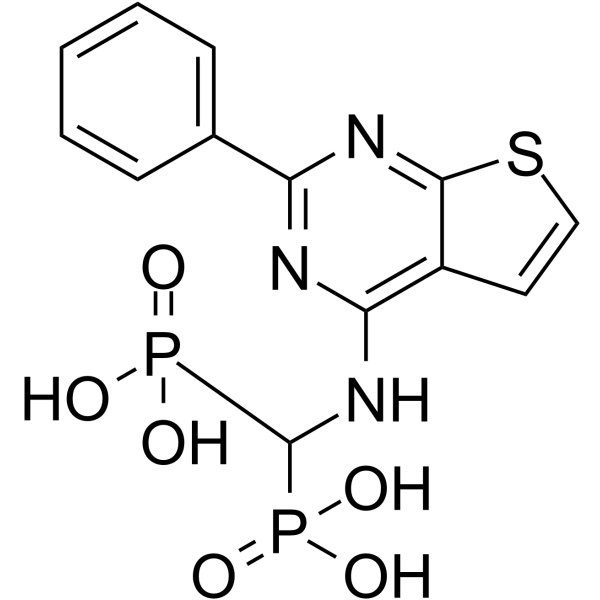
- HY-123714
-
|
|
MAP4K
Apoptosis
|
Inflammation/Immunology
Cancer
|
|
TL4-12 is a selective MAP4K2/GCK inhibitor, dose-dependently downregulates IKZF1 and BCL-6 and leads to MM cell proliferation inhibition (IC50=37 nM) accompanied by induction of apoptosis. TL4-12 can be used to overcome immunomodulatory agent resistance in multiple myeloma (MM) .
|
-
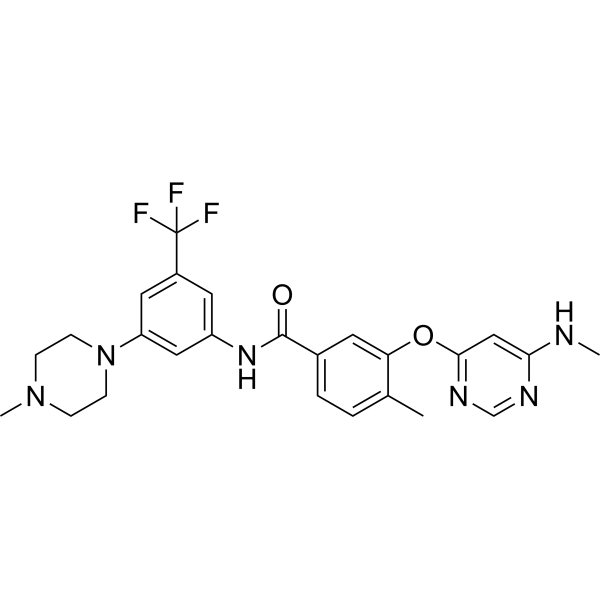
- HY-10224
-
|
LBH589; NVP-LBH589
|
HDAC
Autophagy
HIV
Apoptosis
|
Cancer
|
|
Panobinostat (LBH589; NVP-LBH589) is a potent and orally active non-selective HDAC inhibitor, and has antineoplastic activities . Panobinostat induces HIV-1 virus production even at low concentration range 8-31 nM, stimulates HIV-1 expression in latently infected cells . Panobinostat induces cell apoptosis and autophagy. Panobinostat can be used for the study of refractory or relapsed multiple myeloma .
|
-
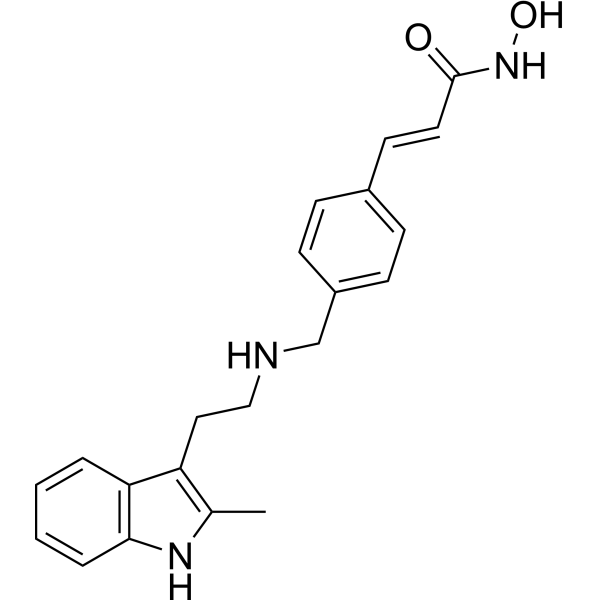
- HY-157871
-
|
|
MAP3K
|
Cancer
|
|
TAK1-IN-5 (Compound 26) is an inhibitor of the transforming growth factor-β activated kinase (TAK1) with an IC50 value of 55 nM. TAK1-IN-5 can inhibit the growth of MPC-11 and H929 cells with a GI50 lower than 30 nM. TAK1-IN-5 can be used in the study of multiple myeloma .
|
-
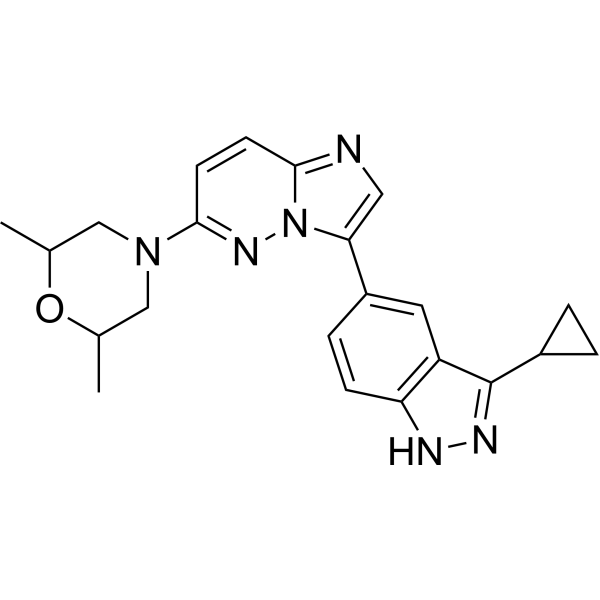
- HY-155671
-
|
|
HDAC
|
Cancer
|
|
HDAC6-IN-18 (Compound 4) is a first irreversible HDAC6 isoform selective inhibitor with potent anti-multiple myeloma activity. HDAC6-IN-18 has HDAC6 inhibitory activity in RPMI8266, U266 and MM.1S cells with IC50 values of 0.17, 0.7 and 0.42 μM, respectively .
|
-
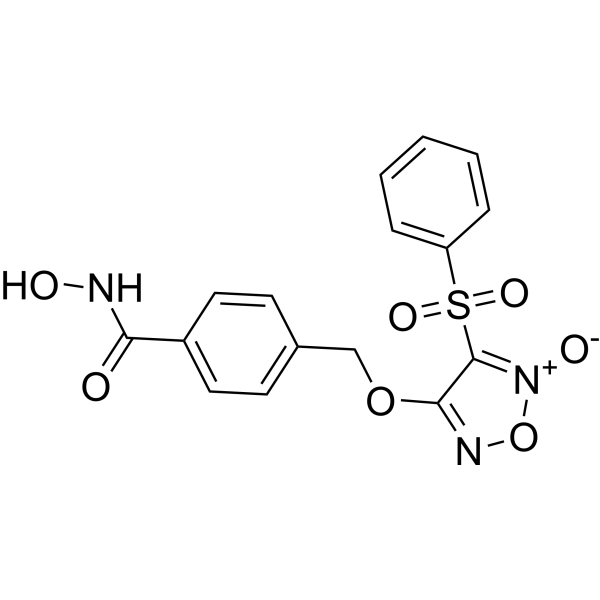
- HY-145320
-
-
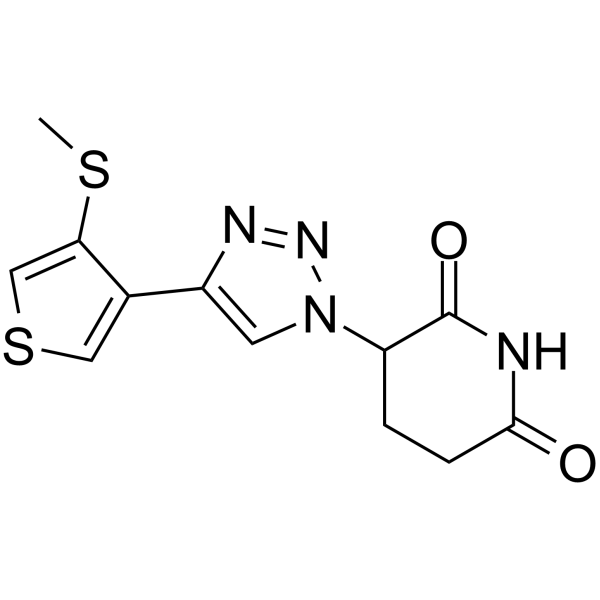
- HY-10406
-
|
SCIO-469
|
p38 MAPK
|
Cancer
|
|
Talmapimod (SCIO-469) is an orally active, selective, and ATP-competitive p38α inhibitor with an IC50 of 9 nM. Talmapimod shows about 10-fold selectivity over p38β, and at least 2000-fold selectivity over a panel of 20 other kinases, including other MAPKs .
|
-
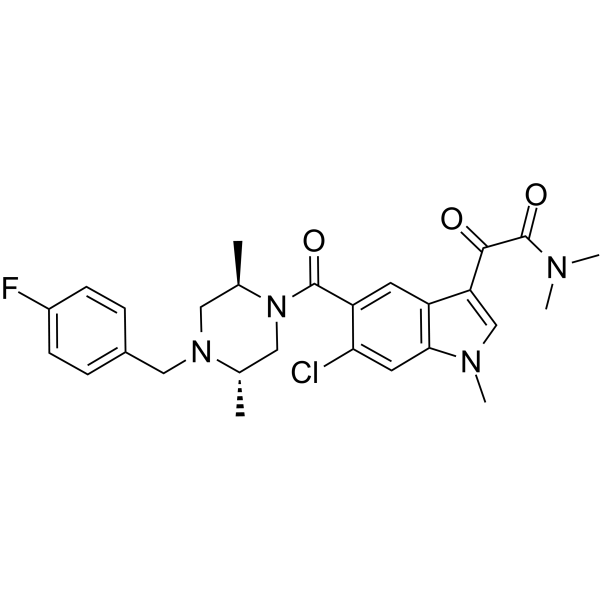
- HY-10406A
-
|
SCIO-469 hydrochloride
|
p38 MAPK
|
Cancer
|
|
Talmapimod (SCIO-469) hydrochloride is an orally active, selective, and ATP-competitive p38α inhibitor with an IC50 of 9 nM. Talmapimod hydrochloride shows about 10-fold selectivity over p38β, and at least 2000-fold selectivity over a panel of 20 other kinases, including other MAPKs .
|
-
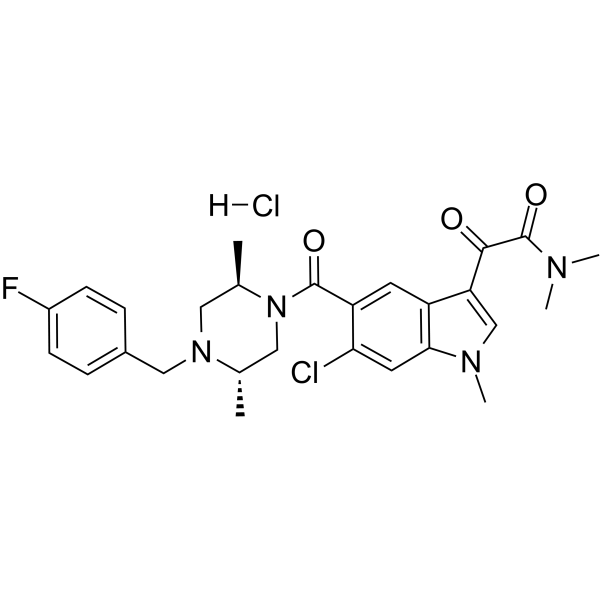
- HY-148203
-
|
|
Bcl-2 Family
|
Cancer
|
|
Mcl-1 inhibitor 9 (example 2) is a myeloid cell leukemia 1 (Mcl-1) inhibitor with IC50 value of 0.21889 nM. Mcl-1 inhibitor 9 shows anti-tumor activity .
|
-
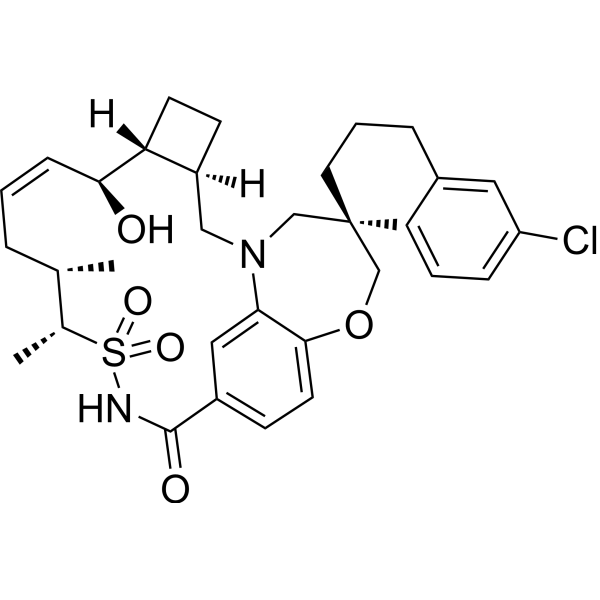
- HY-102047
-
|
|
Histone Demethylase
|
Cancer
|
|
KDOAM-25 is a potent and highly selective histone lysine demethylases 5 (KDM5) inhibitor with IC50s of 71 nM, 19 nM, 69 nM, 69 nM for KDM5A, KDM5B, KDM5C, KDM5D, respectively. KDOAM-25 increases global H3K4 methylation at transcriptional start sites and impairs proliferation in multiple myeloma MM1S cells .
|
-
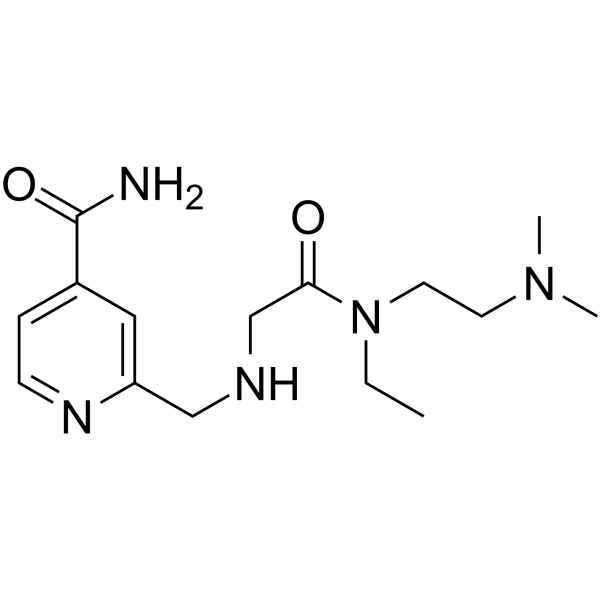
- HY-102047A
-
|
|
Histone Demethylase
|
Cancer
|
|
KDOAM-25 trihydrochloride is a potent and highly selective histone lysine demethylases 5 (KDM5) inhibitor with IC50s of 71 nM, 19 nM, 69 nM, 69 nM for KDM5A, KDM5B, KDM5C, KDM5D, respectively. KDOAM-25 trihydrochloride increases global H3K4 methylation at transcriptional start sites and impairs proliferation in multiple myeloma MM1S cells .
|
-
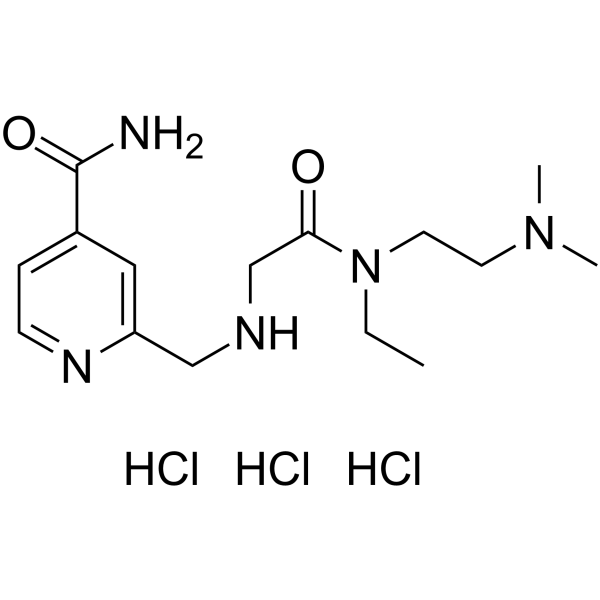
- HY-A0003
-
|
CC-5013
|
Ligands for E3 Ligase
Molecular Glues
Apoptosis
|
Inflammation/Immunology
Cancer
|
|
Lenalidomide (CC-5013), a derivative of Thalidomide, acts as molecular glue. Lenalidomide is an orally active immunomodulator. Lenalidomide (CC-5013) is a ligand of ubiquitin E3 ligase cereblon (CRBN), and it causes selective ubiquitination and degradation of two lymphoid transcription factors, IKZF1 and IKZF3, by the CRBN-CRL4 ubiquitin ligase. Lenalidomide (CC-5013) specifically inhibits growth of mature B-cell lymphomas, including multiple myeloma, and induces IL-2 release from T cells .
|
-
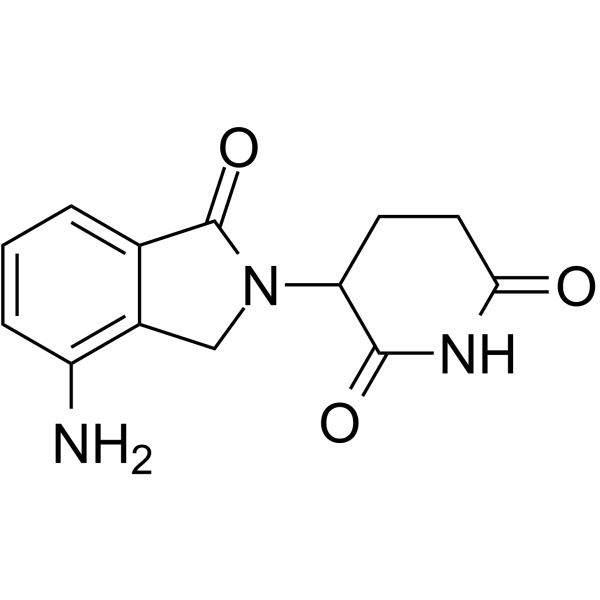
- HY-A0003B
-
|
CC-5013 hemihydrate
|
Ligands for E3 Ligase
Molecular Glues
Apoptosis
|
Cancer
|
|
Lenalidomide hemihydrate (CC-5013 hemihydrate), a derivative of Thalidomide, acts as molecular glue. Lenalidomide hemihydrate is an orally active immunomodulator. Lenalidomide hemihydrate (CC-5013 hemihydrate) is a ligand of ubiquitin E3 ligase cereblon (CRBN), and it causes selective ubiquitination and degradation of two lymphoid transcription factors, IKZF1 and IKZF3, by the CRBN-CRL4 ubiquitin ligase. Lenalidomide hemihydrate (CC-5013 hemihydrate) specifically inhibits growth of mature B-cell lymphomas, including multiple myeloma, and induces IL-2 release from T cells .
|
-
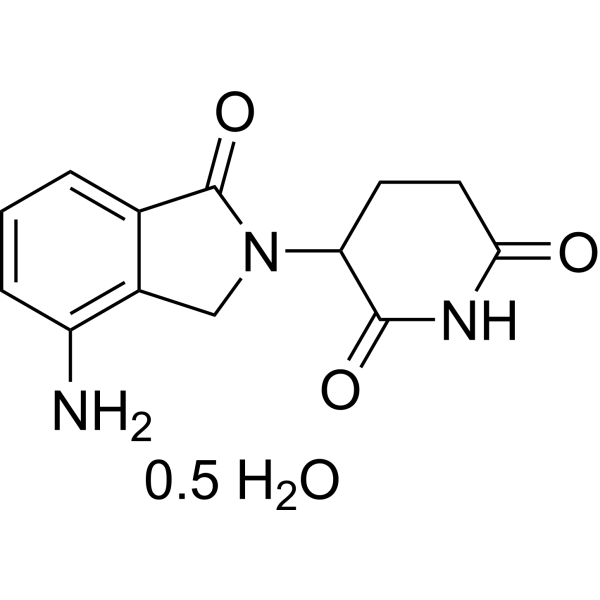
- HY-A0003A
-
|
CC-5013 hydrochloride
|
Ligands for E3 Ligase
Molecular Glues
|
Inflammation/Immunology
Cancer
|
|
Lenalidomide hydrochloride (CC-5013 hydrochloride), a derivative of Thalidomide, acts as molecular glue. Lenalidomide hydrochloride is an orally active immunomodulator. Lenalidomide hydrochloride (CC-5013 hydrochloride) is a ligand of ubiquitin E3 ligase cereblon (CRBN), and it causes selective ubiquitination and degradation of two lymphoid transcription factors, IKZF1 and IKZF3, by the CRBN-CRL4 ubiquitin ligase. Lenalidomide hydrochloride (CC-5013 hydrochloride) specifically inhibits growth of mature B-cell lymphomas, including multiple myeloma, and induces IL-2 release from T cells .
|
-
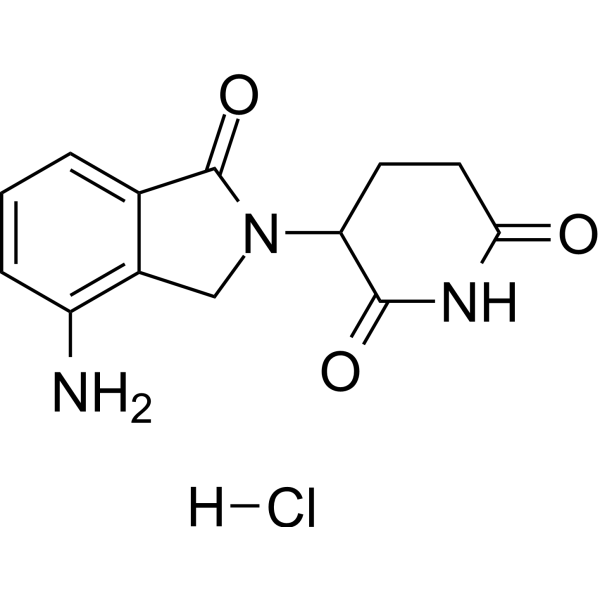
- HY-102047B
-
|
|
Histone Demethylase
|
Cancer
|
|
KDOAM-25 citrate is a potent and highly selective histone lysine demethylases 5 (KDM5) inhibitor with IC50s of 71 nM, 19 nM, 69 nM, 69 nM for KDM5A, KDM5B, KDM5C, KDM5D, respectively. KDOAM-25 citrate increases global H3K4 methylation at transcriptional start sites and impairs proliferation in multiple myeloma MM1S cells .
|
-
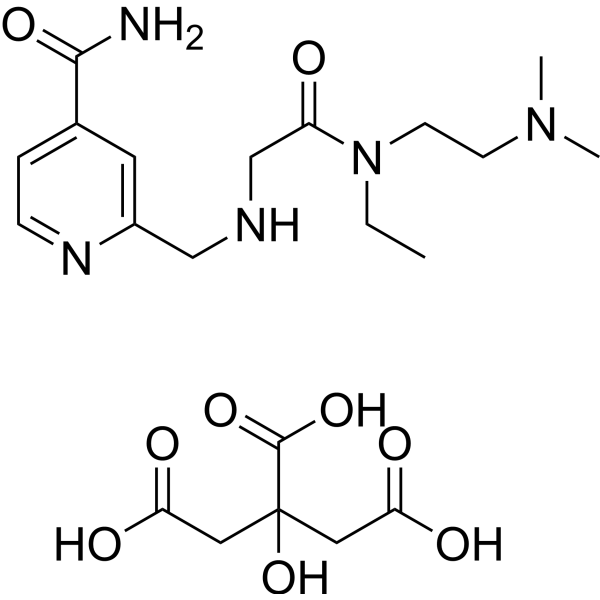
- HY-123587A
-
|
|
Others
|
Cancer
|
|
(R)-PR-924 is the isomer of PR-924 (HY-123587), and can be used as an experimental control. PR-924 is a selective tripeptide epoxyketone immunoproteasome subunit LMP-7 inhibitor with an IC50 of 22 nM. PR-924 covalently modifies proteasomal N-terminal threonine active sites. PR-924 inhibits growth and triggers apoptosis in multiple myeloma (MM) cells. PR-924 has antitumor activities .
|
-
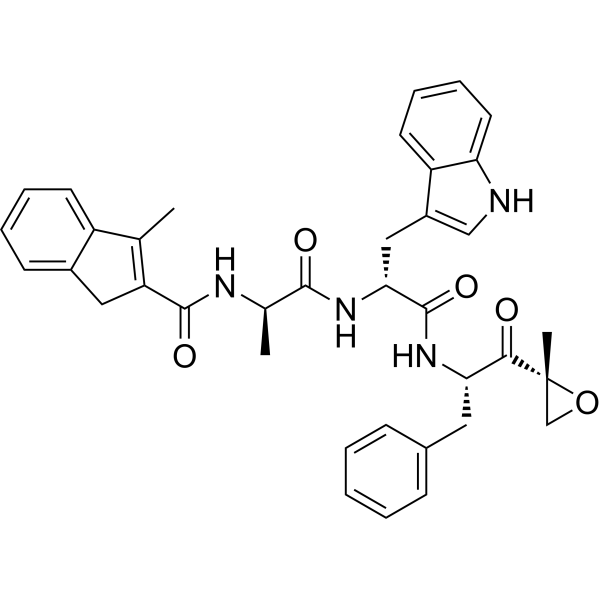
- HY-107592
-
|
|
IKK
STAT
Apoptosis
|
Inflammation/Immunology
Cancer
|
|
ACHP (compound 4j) is a selective and orally active IκB kinase inhibitor with IC50 values of 8.5 nM and 250 nM for IKKβ and IKKα, respectively. ACHP can effectively inhibit the STAT3 signaling pathway and induce cancer cell cycle arrest and apoptosis. ACHP shows anti-inflammatory activity in a mouse ear edema model. ACHP can be used in anti-inflammatory and anti-cancer (such as multiple myeloma and leukemia) studies .
|
-
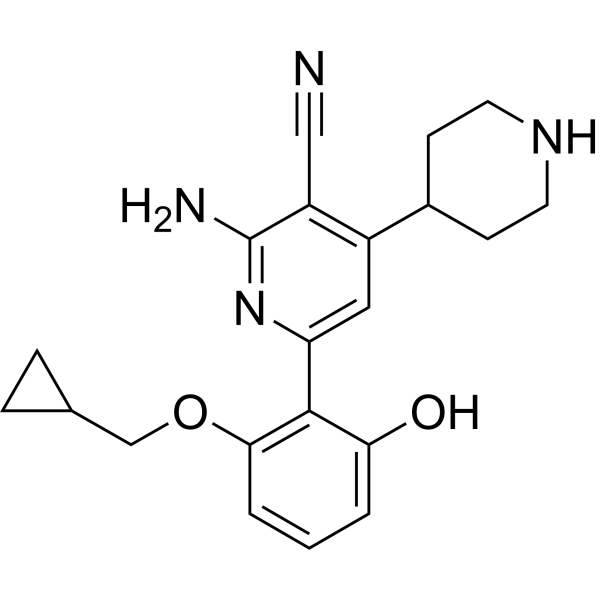
- HY-A0003S
-
|
CC-5013-d5
|
Isotope-Labeled Compounds
Ligands for E3 Ligase
Molecular Glues
Apoptosis
|
Inflammation/Immunology
Cancer
|
|
Lenalidomide-d5 is deuterium labeled Lenalidomide. Lenalidomide (CC-5013), a derivative of Thalidomide, acts as molecular glue. Lenalidomide is an orally active immunomodulator. Lenalidomide (CC-5013) is a ligand of ubiquitin E3 ligase cereblon (CRBN), and it causes selective ubiquitination and degradation of two lymphoid transcription factors, IKZF1 and IKZF3, by the CRBN-CRL4 ubiquitin ligase. Lenalidomide (CC-5013) specifically inhibits growth of mature B-cell lymphomas, including multiple myeloma, and induces IL-2 release from T cells[1][2].
|
-
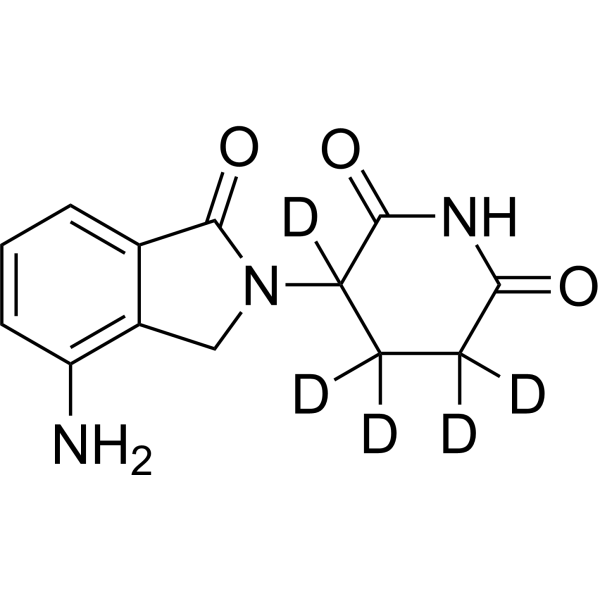
- HY-119271
-
|
SDS-1-021
|
c-Myc
Apoptosis
|
Cancer
|
|
CMLD010509 (SDS-1-021) is a highly specific inhibitor of the oncogenic translation program supporting multiple myeloma (MM)-including key oncoproteins such as MYC, MDM2, CCND1, MAF, and MCL-1. CMLD010509 (SDS-1-021) shows an IC50 below 10 nM for most MM cell lines and induces apoptosis. CMLD010509 (SDS-1-021) is a potent and selective translation inhibitor through an eIF4E phosphorylation-independent mechanism .
|
-
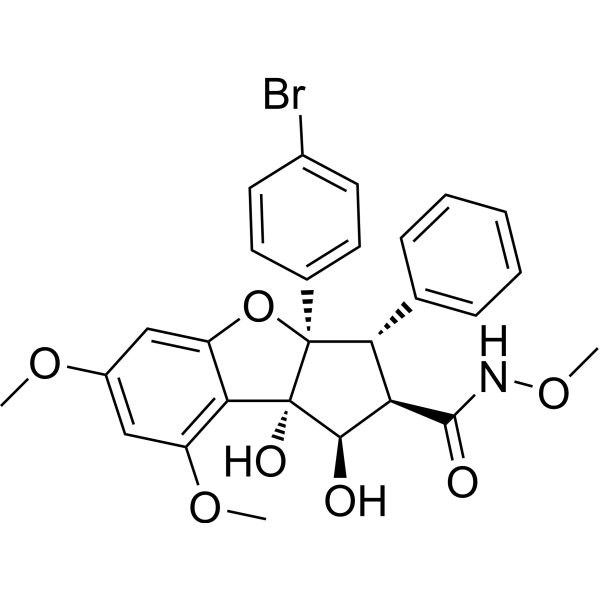
- HY-161250
-
|
|
PROTACs
|
Cancer
|
|
Pomalidomide-NH-PEG6-amide-C2-CPI-1612 (compound 22 (dCE-1)) is a CBP/EP300 degrader, which contains a CRBN ligands Pomalidomide, a 24-atom linker with 6 PEG units and a HAT inhibitor CPI-1612. Pomalidomide-NH-PEG6-amide-C2-CPI-1612 exhibits antiproliferative effects in cells multiple myeloma cells LP1 (with a DC50 of 1.2 μM), MM1S and various cancer cell lines, especially the leukemia cells .
|
-
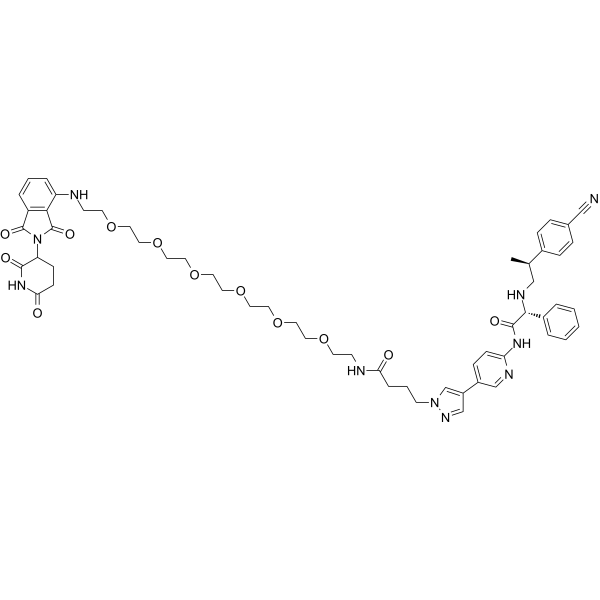
- HY-15287A
-
|
AG 1343 Mesylate
|
HIV Protease
HIV
|
Infection
Cancer
|
|
Nelfinavir Mesylate (AG 1343 Mesylate) is a potent and orally bioavailable HIV-1 protease inhibitor (Ki=2 nM) for HIV infection. Nelfinavir Mesylate (AG 1343 Mesylate) is a broad-spectrum, anticancer agent .
|
-
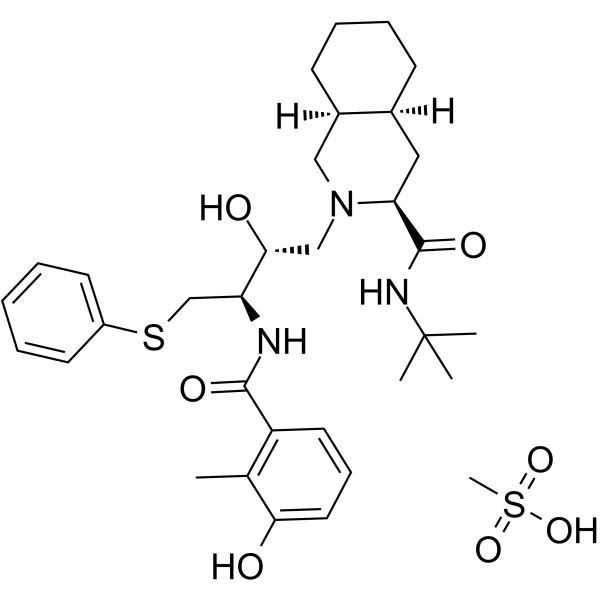
- HY-15287
-
|
AG1341
|
HIV Protease
HIV
|
Infection
Cancer
|
|
Nelfinavir (AG-1341) is a potent and orally bioavailable HIV-1 protease inhibitor (Ki=2 nM) for HIV infection. Nelfinavir is a broad-spectrum, anticancer agent .
|
-
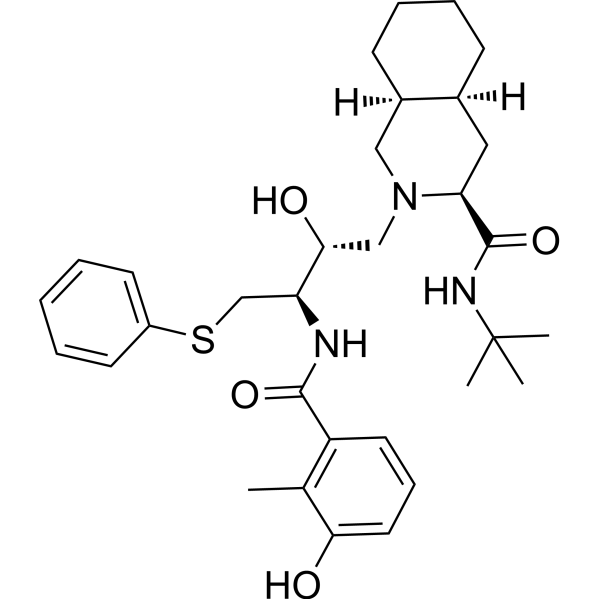
- HY-18621
-
OTS514
2 Publications Verification
|
TOPK
Apoptosis
|
Cancer
|
|
OTS514 is a highly potent TOPK inhibitor with an IC50 of 2.6 nM. OTS514 strongly suppresses the growth of TOPK-positive cancer cells . OTS514 induces cell cycle arrest and apoptosis .
|
-
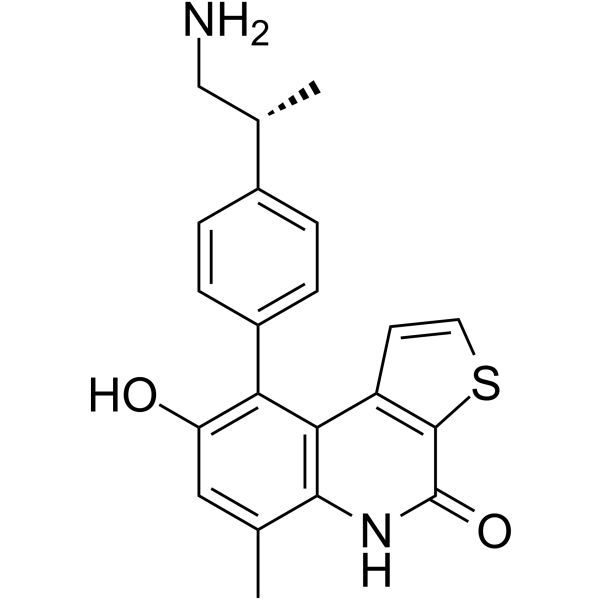
- HY-18621A
-
|
|
TOPK
Apoptosis
|
Cancer
|
|
OTS514 hydrochloride is a highly potent TOPK inhibitor, which inhibits TOPK kinase activity with a median inhibitory concentration (IC50) value of 2.6 nM. OTS514 hydrochloride strongly suppresses the growth of TOPK-positive cancer cells . OTS514 hydrochloride induces cell cycle arrest and apoptosis .
|
-
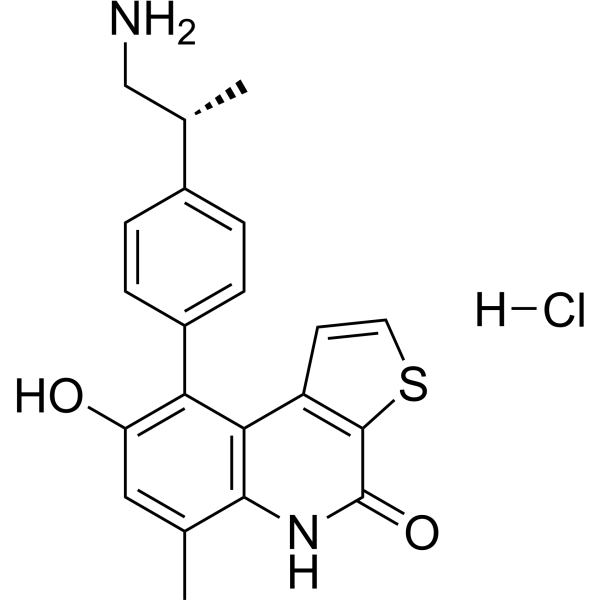
- HY-143435
-
|
|
Apoptosis
|
Cancer
|
|
AG6033 is a potential novel CRBN modulator. AG6033 suppresses various tumor cells by modulating the interactions between CRBN and various antitumor target proteins. AG6033 can cause GSPT1 and IKZF1 degradation. AG6033 induces CRBN-dependent cytotoxic effect .
|
-
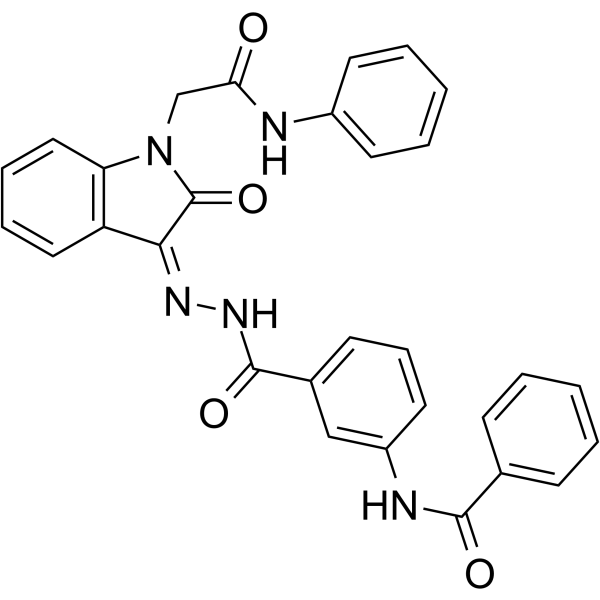
- HY-10046
-
Plerixafor
Maximum Cited Publications
60 Publications Verification
AMD 3100; JM3100; SID791
|
CXCR
HIV
|
Infection
Inflammation/Immunology
Endocrinology
Cancer
|
|
Plerixafor (AMD 3100) is a selective CXCR4 antagonist with an IC50 of 44 nM. Plerixafor, an immunostimulant and a hematopoietic stem cell (HSC) mobilizer, is an allosteric agonist of CXCR7. Plerixafor inhibits HIV-1 and HIV-2 replication with an EC50 of 1-10 nM .
|
-
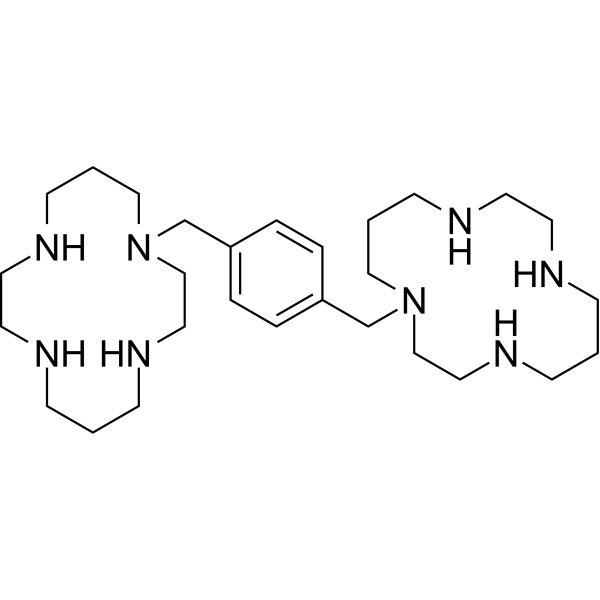
- HY-115620
-
|
|
Phosphatase
PI3K
TNF Receptor
|
Inflammation/Immunology
|
|
AQX-016A is an orally active and potent SHIP1 agonist. AQX-016A can activate recombinant SHIP1 enzyme in vitro and stimulate SHIP1 activity. AQX-016A also can inhibit the PI3K pathway and TNFa production, can be useful for various inflammatory diseases research .
|
-
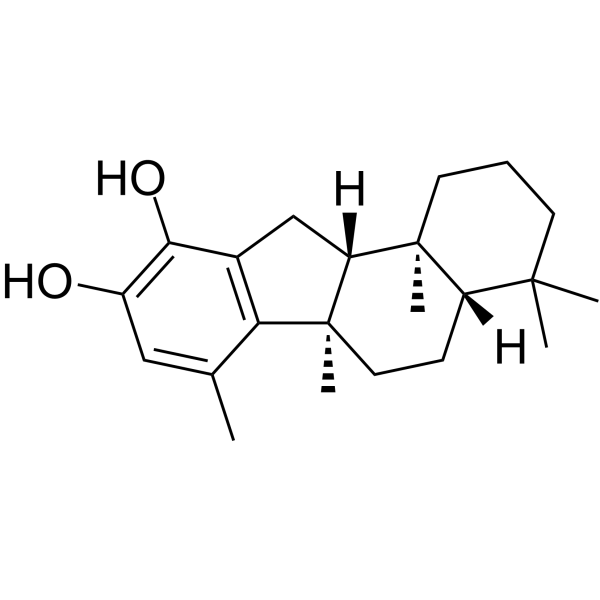
- HY-115993
-
|
|
CDK
Apoptosis
|
Cancer
|
|
CDK4/6-IN-10 is a potent, selective and orally active CDK4 and CDK6 inhibitor with IC50s of 22 nM and 10 nM, respectively. CDK4/6-IN-10 shows antitumor activity. CDK4/6-IN-10 has the potential for the research of Multiple myeloma (MM) .
|
-
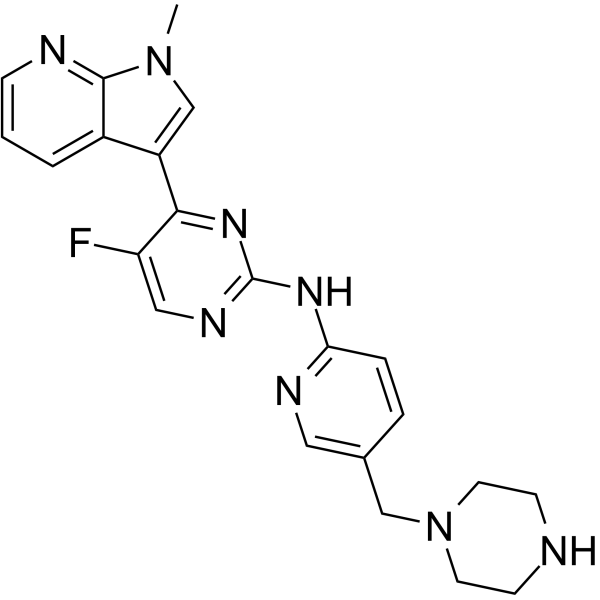
- HY-131061
-
|
|
Epigenetic Reader Domain
|
Cancer
|
|
BET bromodomain inhibitor 1 is an orally active, selective bromodomain and extra-terminal (BET) bromodomain inhibitor with an IC50 of 2.6 nM for BRD4. BET bromodomain inhibitor 1 binds to BRD2(2), BRD3(2), BRD4(1), BRD4(2), and BRDT(2) with high affinities (Kd values of 1.3 nM, 1.0 nM, 3.0 nM, 1.6 nM, 2.1 nM, respectively). bromodomain inhibitor 1 has anti-cancer activity .
|
-
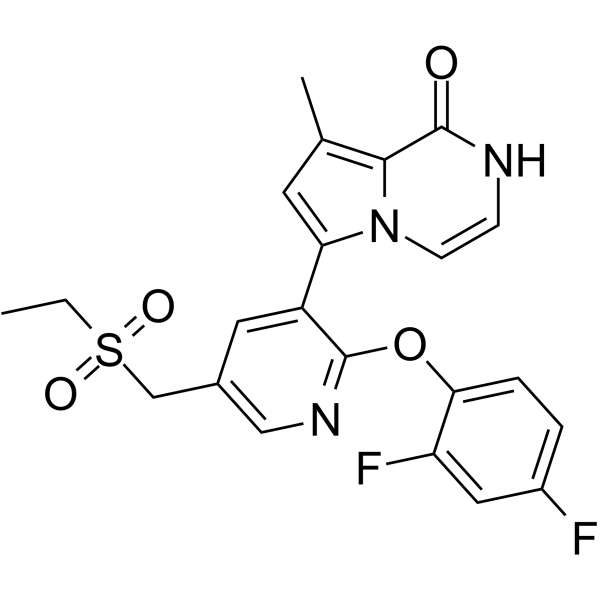
- HY-133136
-
-
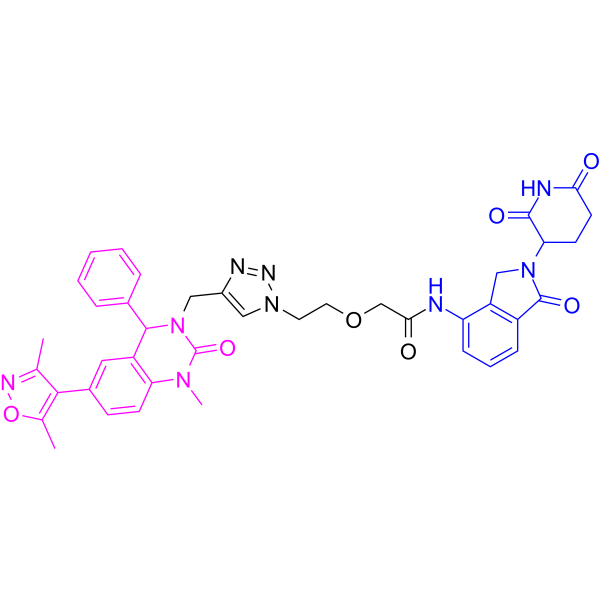
- HY-13560
-
AVN-944
4 Publications Verification
VX-944
|
Arenavirus
DNA/RNA Synthesis
Apoptosis
Caspase
Bcl-2 Family
|
Infection
Cancer
|
|
AVN-944 (VX-944) is an orally active, potent, selective, noncompetitive and specific inhibitor of IMPDH (inosine monophosphate dehydrogenase). AVN-944 is an essential rate-limiting enzyme in de novo guanine nucleotide synthesis. AVN-944 is also an inhibitor of arenavirus RNA synthesis, and blocks arenavirus infection. AVN-944 has broad anti-cancer activities, and can be used for multiple myeloma (MM) and acute myeloid leukemia (AML) research .
|
-
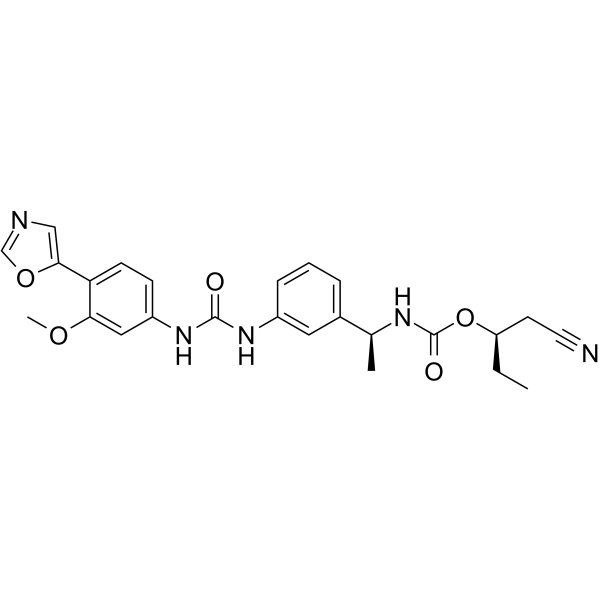
| Cat. No. |
Product Name |
Target |
Research Area |
-
- HY-P1846A
-
|
|
Notch
|
Cancer
|
|
Jagged-1 (188-204) TFA is a fragment of the Jagged-1 (JAG-1) protein with Notch agonist activity. JAG-1 is a Notch ligand highly expressed in cultured and primary multiple myeloma (MM) cells. JAG-1 induces maturation of monocyte-derived human dendritic cells .
|
-
- HY-105019
-
|
Melphalan flufenamide
|
DNA Alkylator/Crosslinker
Apoptosis
|
Cancer
|
|
Melflufen (Melphalan flufenamide), a dipeptide proagent of Melphalan, is an alkylating agent. Melflufen shows antitumor activity against multiple myeloma (MM) cells and inhibits angiogenesis. Melflufen induces irreversible DNA damage and cytotoxicity in MM cells .
|
-
- HY-P1846
-
|
|
Notch
|
Cancer
|
|
Jagged-1 (188-204) is a fragment of the Jagged-1 (JAG-1) protein with Notch agonist activity. JAG-1 is a Notch ligand highly expressed in cultured and primary multiple myeloma (MM) cells. JAG-1 induces maturation of monocyte-derived human dendritic cells .
|
-
- HY-P1126
-
|
DLS 15
|
Microtubule/Tubulin
ADC Cytotoxin
Apoptosis
|
Cancer
|
|
Dolastatin 15 (DLS 15), a depsipeptide derived from Dolabella auricularia, is a potent antimitotic agent structurally related to the antitubulin agent Dolastatin 10. Dolastatin 15 induces cell cycle arrest and apoptosis in multiple myeloma cells. Dolastatin 15 can be used as an ADC cytotoxin .
|
-
- HY-P1700
-
|
|
Peptides
|
Cancer
|
|
BCMA72-80 is a HLA-A2-specific B-cell maturation antigen (BCMA) peptide, with great affinity to HLA-A2, used in the research of multiple myeloma or other B-cell maturation antigen expressing tumors .
|
-
- HY-P5472
-
|
|
Peptides
|
Others
|
|
Tumour-associated MUC1 epitope is a biological active peptide. (This sequence is the hallmark of MUC1 mucin. MUC1 is a highly glycosylated type I transmembrane glycoprotein with a unique extracellular domain consisting of a variable number of tandem repeats (VNTR) of this 20 amino acid peptide. It is overexpressed on the cell surface of many human adenocarcinomas and hematological malignancies, including multiple myeloma and B-cell lymphoma, making MUC1 broadly applicable target for immunotherapeutic strategies.)
|
| Cat. No. |
Product Name |
Target |
Research Area |
-
- HY-P99392
-
|
|
CD3
|
Cancer
|
|
Teclistamab is a human bispecific antibody to BCMA and CD3 that recognizes BCMA on target cells and CD3 on T cells and induces T cell-mediated cytotoxicity leading to T cell activation and subsequent target cell lysis. Teclistamab can be used in studies of diseases related to multiple myeloma (MM) .
|
-
- HY-P99287
-
|
B-E8; Anti-IL-6 MAB B-E8; Anti-Human IL6 Recombinant Antibody
|
Interleukin Related
|
Inflammation/Immunology
Cancer
|
|
Elsilimomab (B-E8) is a IgG1 monoclonal antibody against interleukin-6 (IL-6), with a KD of 22 pM and an IC50 of 1.4 nM. Elsilimomab can be used for the research of multiple myeloma, renal cell carcinoma, and rheumatoid arthritis (RA) .
|
-
- HY-P99814
-
|
AMG-701
|
CD3
|
Inflammation/Immunology
Cancer
|
|
Pavurutamab (AMG-701) is a bispecific T cell engager molecule that anti-CD3 and anti-B cell maturation antigens (BCMA). Pavurutamab has an extended half-life based on Pacanalotamab (HY-P99798). The Fc of Pavurutamab is coupled to molecules to improve pharmacokinetic parameters. Pavurutamab has potential applications in immune regulation and multiple myeloma (MM) .
|
-
- HY-P99381
-
|
|
Inhibitory Antibodies
|
Cancer
|
|
XmAb 5592 is a humanized, Fc-engineered anti-HM1.24 antibody with enhanced binding to FcγRIIIa and FcγRIIa receptors, augments HM1.24-specific multiple myeloma (MM) cells lysis in vitro via antibody-dependent cellular cytotoxicity (ADCC) and antibody dependent cellular phagocytosis (ADCP) .
|
-
- HY-P99536
-
|
SL-401
|
Interleukin Related
|
Cancer
|
|
Tagraxofusp (SL-401) is a potent IL-3 receptor inhibitor to inhibits plasmacytoid dendritic cells (pDCs) growth in multiple myeloma (MM) bone marrow (BM) microenvironment. Tagraxofusp has synergistic effect with Bortezomib (HY-10227) and Pomalidomide (HY-10984) to suppress multiple myeloma (MM) .
|
-
- HY-P99798
-
|
AMG 420; BI-836909
|
CD3
|
Cancer
|
|
Pacanalotamab (AMG 420; BI-836909) is a bispecific T-cell engager (BiTE) targeting to BCMA and CD3ɛ. BCMA refers to B cell maturation antigen, as Pacanalotamab redirecting T cells to BCMA expressing cells on the cell surface. Pacanalotamab conducts T-cell redirected lysis of human multiple myeloma (MM) cell lines .
|
-
- HY-P99453
-
|
|
ADC Antibody
|
Cancer
|
|
Azintuxizumab is a monoclonal, targeting to B-cell maturation antigen (BCMA) and SLAMF7/CRACC/CD319, IgG1 bispecific antibody. Azintuxizumab has the potential for the research of relapsed/refractory multiple myeloma (RRMM) .
|
-
- HY-P99400
-
|
ALXN 6000
|
Inhibitory Antibodies
|
Cancer
|
|
Samalizumab (ALXN 6000) is a humanized monoclonal antibody that specifically binds to CD200 and blocks its ligation to the CD200 receptor (CD200R). Samalizumab can be used for multiple myeloma and B-cell chronic lymphocytic leukemia research .
|
-
- HY-P99601
-
|
BFCR 4350A; RG 6160; RO 7187797
|
CD3
|
Neurological Disease
Cancer
|
|
Cevostamab (BFCR4350A; RG6160; RO7187797) is a humanized IgG1-based BsAb that targets membrane-proximal extracellular domain of FcRH5 on multiple myeloma (MM) cells as well as CD3 on T cells. Moreover, Cevostamab facilitates efficient synapse formation, improves killing activity of T cells against MM tumor cells .
|
-
- HY-P9915
-
|
Anti-Human CD38, Human Antibody
|
CD38
ADC Antibody
|
Inflammation/Immunology
Cancer
|
|
Daratumumab (Anti-Human CD38) is the first-in-class human-specific anti-CD38 monoclonal antibody (IgG1). Daratumumab has anti-multiple myeloma (MM) effect. Daratumumab impairs MM cell adhesion, which results in an increased sensitivity of MM to proteasome inhibition .
|
-
- HY-P9915A
-
|
Anti-Human CD38, Human Antibody (PBS)
|
ADC Antibody
CD38
|
Cancer
|
|
Daratumumab (PBS) (Anti-Human CD38) is the first-in-class human-specific anti-CD38 monoclonal antibody (IgG1). Daratumumab (PBS) has anti-multiple myeloma (MM) effect. Daratumumab (PBS) impairs MM cell adhesion, which results in an increased sensitivity of MM to proteasome inhibition .
|
-
- HY-P99167
-
|
HCD122
|
TNF Receptor
|
Cancer
|
|
Lucatumumab (HCD122) is a fully human anti-CD40 antagonist monoclonal antibody, which blocks CD40/CD40L-mediated signaling. Lucatumumab efficiently mediates antibody-dependent cell-mediated cytotoxicity (ADCC) and clearance of tumor cells, can be used for refractory lymphomas, CLL and multiple myeloma research .
|
-
- HY-P99015
-
|
|
TNF Receptor
|
Cancer
|
|
Dacetuzumab (SGN-40) is a humanized IgG1, anti-CD40 monoclonal antibody with anti-lymphoma activity. Dacetuzumab kills tumor cells via immune effector functions (antibody-dependent cellular cytotoxicity and phagocytosis [ADCC/ADCP]). Dacetuzumab ((SGN-40) can be used for multiple myeloma research .
|
-
- HY-P99730
-
|
TAK-079
|
CD38
|
Cancer
|
|
Mezagitamab (TAK-079) is a IgG1λ anti-CD38 monoclonal antibody. Mezagitamab depletes tumor cells expressing CD38 through antibody and complement dependent cytotoxicity. Mezagitamab has potential application in relapsed/refractory multiple myeloma (RRMM) and idiopathic thrombocytopenic purpura (ITP) .
|
-
- HY-P9976
-
|
|
Apoptosis
|
Cancer
|
|
Isatuximab is a monoclonal antibody targeting the transmembrane receptor and ectoenzyme CD38, a protein highly expressed on hematological malignant cells, including those in multiple myeloma (MM). Isatuximab has antitumor activity via multiple biological mechanisms, including antibody-dependent cellular-mediated cytotoxicity, complement-dependent cytotoxicity, antibody-dependent cellular phagocytosis, and direct induction of apoptosis without crosslinking. Isatuximab also directly inhibits CD38 ectoenzyme activity, which is implicated in many cellular functions .
|
| Cat. No. |
Product Name |
Chemical Structure |
-
- HY-A0003S
-
|
|
|
Lenalidomide-d5 is deuterium labeled Lenalidomide. Lenalidomide (CC-5013), a derivative of Thalidomide, acts as molecular glue. Lenalidomide is an orally active immunomodulator. Lenalidomide (CC-5013) is a ligand of ubiquitin E3 ligase cereblon (CRBN), and it causes selective ubiquitination and degradation of two lymphoid transcription factors, IKZF1 and IKZF3, by the CRBN-CRL4 ubiquitin ligase. Lenalidomide (CC-5013) specifically inhibits growth of mature B-cell lymphomas, including multiple myeloma, and induces IL-2 release from T cells[1][2].
|
-

-
- HY-10224S
-
|
|
|
Panobinostat-d4 is the deuterium labeled Panobinostat. Panobinostat (LBH589; NVP-LBH589) is a potent and orally active non-selective HDAC inhibitor, and has antineoplastic activities[1][2]. Panobinostat induces HIV-1 virus production even at low concentration range 8-31 nM, stimulates HIV-1 expression in latently infected cells[4]. Panobinostat induces cell apoptosis and autophagy. Panobinostat can be used for the study of refractory or relapsed multiple myeloma[3].
|
-

-
- HY-10224S1
-
|
|
|
Panobinostat-d4 (hydrochloride) is deuterium labeled Panobinostat. Panobinostat (LBH589; NVP-LBH589) is a potent and orally active non-selective HDAC inhibitor, and has antineoplastic activities[1][2]. Panobinostat induces HIV-1 virus production even at low concentration range 8-31 nM, stimulates HIV-1 expression in latently infected cells[4]. Panobinostat induces cell apoptosis and autophagy. Panobinostat can be used for the study of refractory or relapsed multiple myeloma[3].
|
-

Your information is safe with us. * Required Fields.
Inquiry Information
- Product Name:
- Cat. No.:
- Quantity:
- MCE Japan Authorized Agent:



































































































